- Silk Road 8: Khunjerab Pass to Passu, Hunza, Pakistan
- Silk Road 9: Karakorum Highway; Karimabad, Pakistan
- Silk Road 10: Gilgit to Skardu, Pakistan
- Silk Road 11 : Skardu; and Khaplu Fort, Pakistan
- Silk Road 12 : Onto Shigar Fort and onwards
- Silk Road 13 : Giglit to Islamabad via Kohistan
- Final Silk Road Episode: Islamabad and Lahore
Now starts the Pakistani side of our adventure in Hunza valley (district) and Gilgit-Baltistan; having crossed over from Xinjiang, China over the Khunjerab Pass. (Please visit https://alikarimtravelog.com/category/asia/china/silk-road-china/ for the China Silk Road trip) Hunza is a mostly Ismaili district of Gilgit-Baltistan Province; which was originally part of Kashmir before partition. For Ismaili’s that want to know about our experiences meeting the local Ismaili population, their lives, JK’s etc in Hunza, please PM me.
Checkout how we crossed the border and what are the immigration formalities
The Pakistani border post is at Sost; which is about 75kms from Khunjerab pass. So while we were physically in Pakistan, we were not officially in Pakistan since we had not been processed by Pakistani Immigration. So we stayed on the bus, and had to cross the Khunjerab National Park, where we, foreigners (USA, Korea) had to pay US$8 cash each to pass through the National Park. Pakistanis and Chinese were exempt ☺; no stopping allowed in the National Park, because we had not officially entered Pakistan.
Along the KKH, we saw lots of rockslides and glacier slides over the KKH; the Pakistani side of the KKH was certainly not as well taken care of as the KKH on the Chinese side; where it was immaculate.
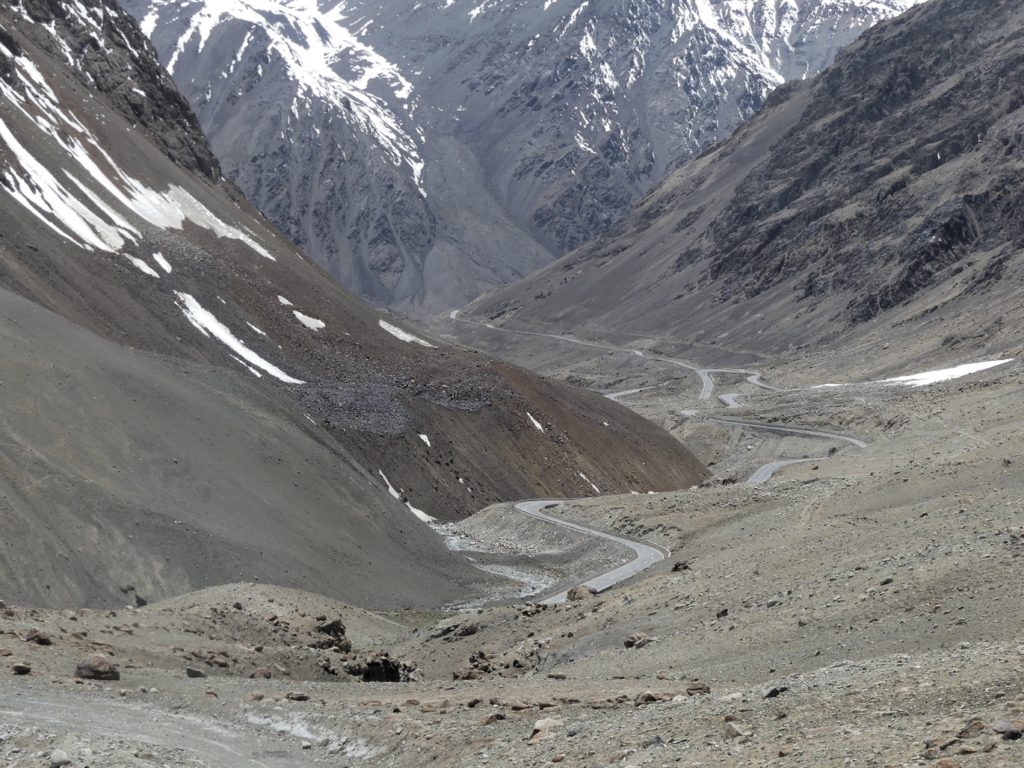 Snaking Karakoram Highway (KKH) in upper Hunza valley
Snaking Karakoram Highway (KKH) in upper Hunza valley
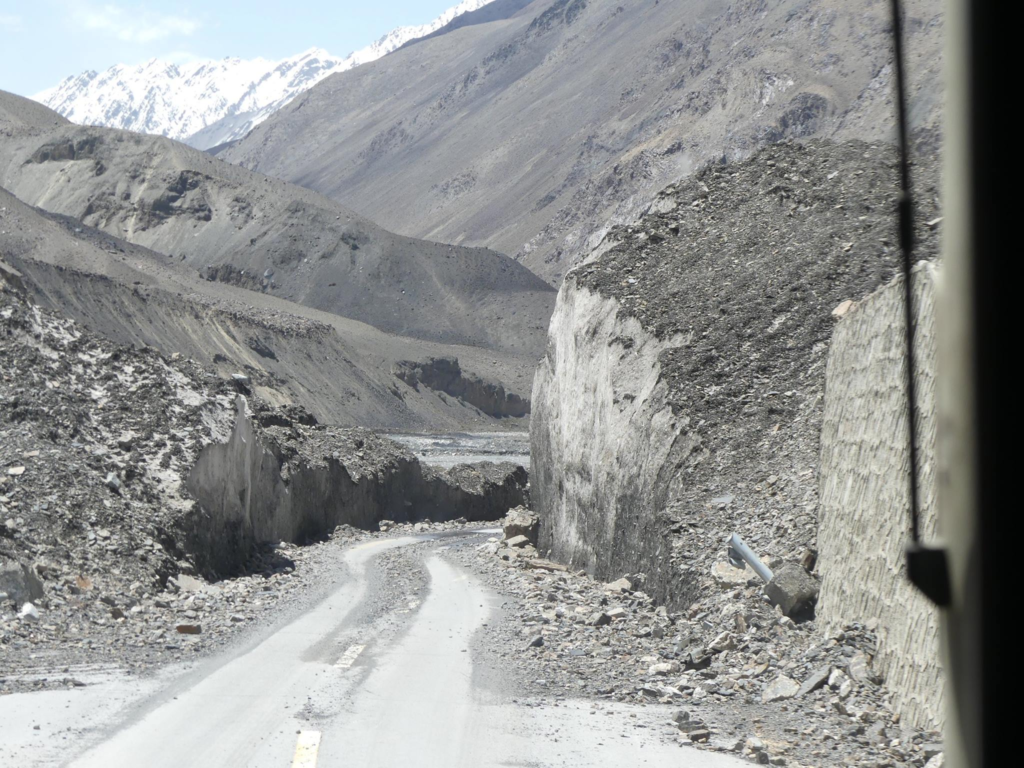 Glacier slide over KKH; note the snow/ice with rocks on both sides of the road
Glacier slide over KKH; note the snow/ice with rocks on both sides of the road
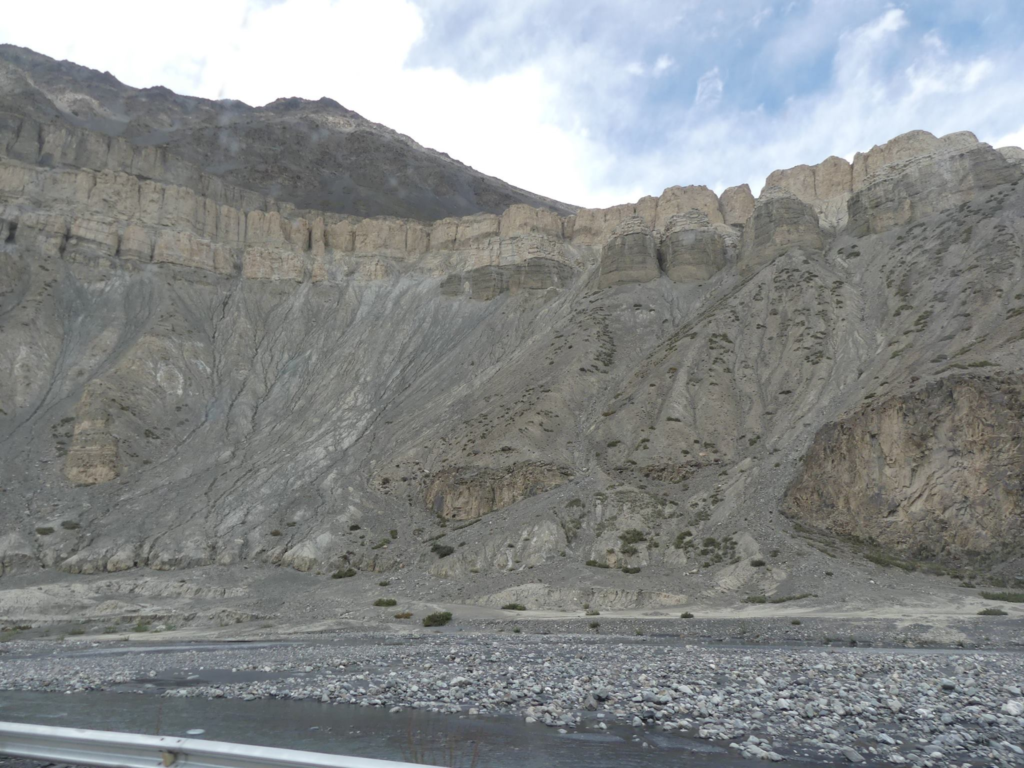 Wonderful Rock formations along the Hunza river
Wonderful Rock formations along the Hunza river
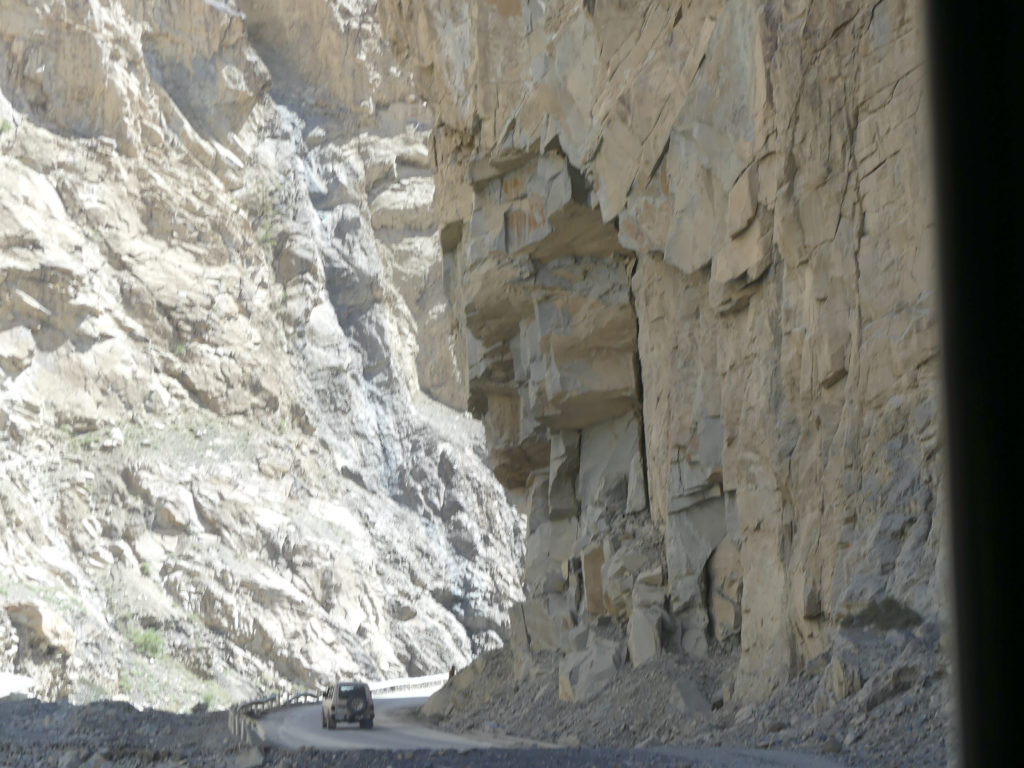 Massive rocks towering over the KKH
Massive rocks towering over the KKH
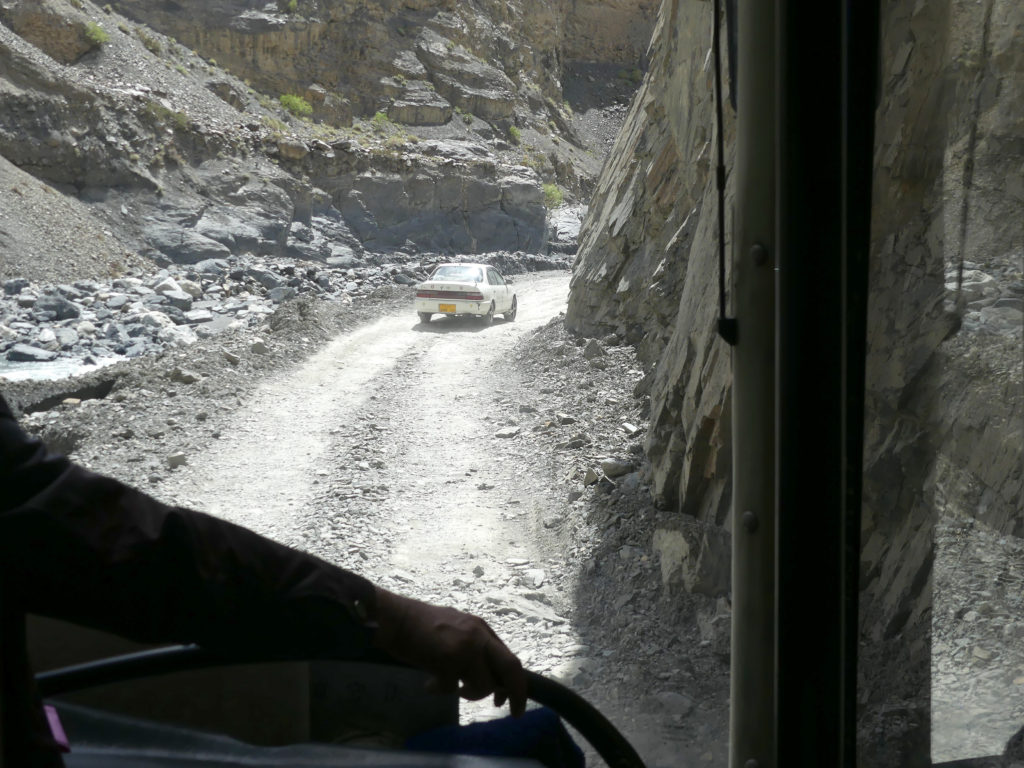 Rock slide over KKH, completely covering the 2 lane tarmacked KKH
Rock slide over KKH, completely covering the 2 lane tarmacked KKH
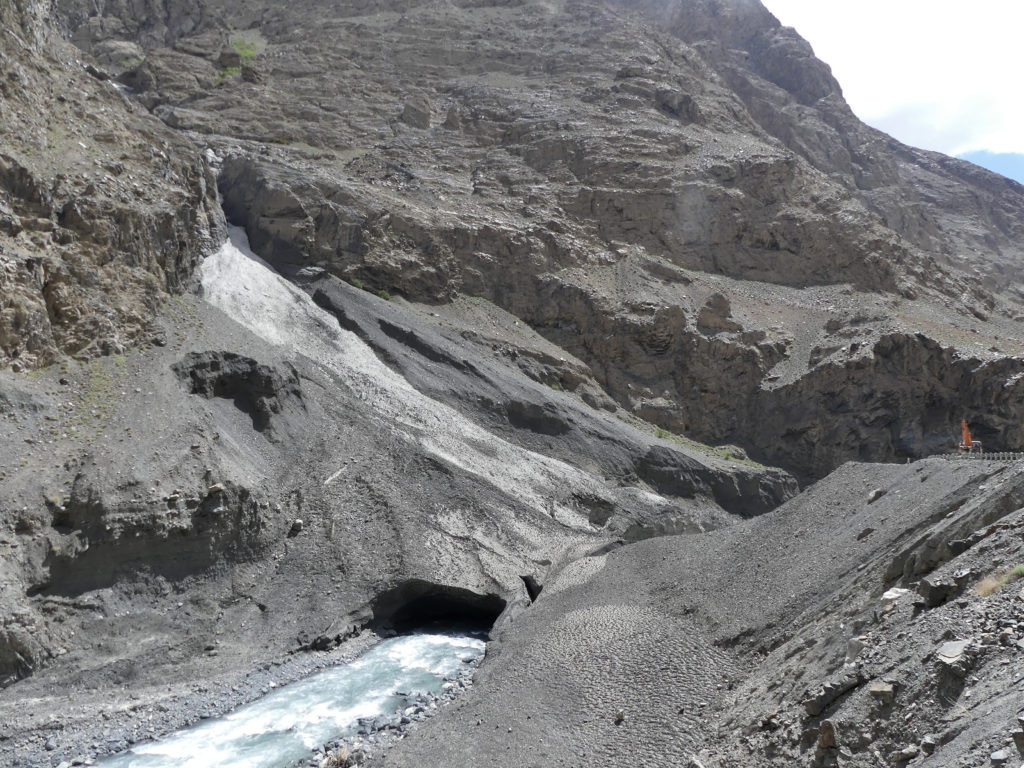 Black Glacier (glacier that has turned darker color due to picking up dirt and rocks) that has avalanched over the Hunza river
Black Glacier (glacier that has turned darker color due to picking up dirt and rocks) that has avalanched over the Hunza river
At one point, we were forced to stop completely as the road was closed off; which we were told was because of a rock slide further up the road. We were informed it would take about 30-40mins to clear the road. So we waited and stretched our legs. Suddenly, there was a very loud explosion and I panicked as I thought that might be another rock slide near us. However, it turned out that this was a controlled blast of the rocks on the rockslide ahead to allow the earth mover to clear the KKH.
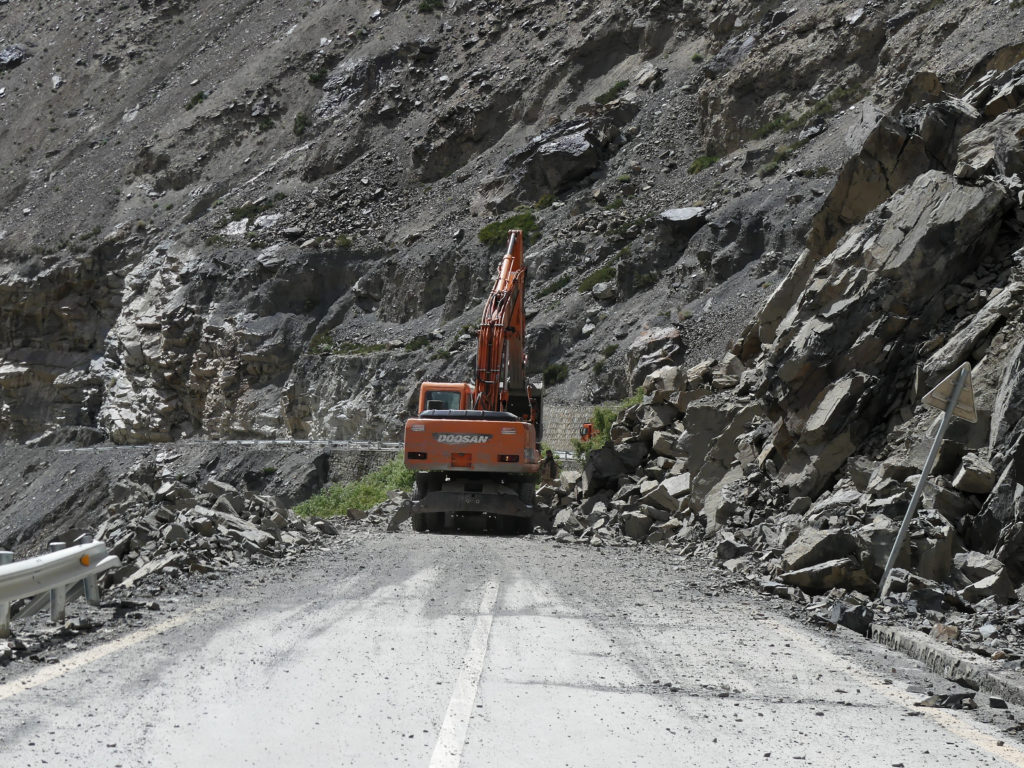 Clearing the rock slide after blasting the huge rocks
Clearing the rock slide after blasting the huge rocks
Soon, we reached Sost, which is the official border post, and were met by Zafar, our (Ismaili) driver. After clearing Pakistani customs/immigration, we left the bus (as did most fellow passengers), and made our way to Passu village. We were now in Upper Hunza valley. There were multiple small villages along the way, all along the river valley where flat land was either available or terraced to allow growing of crops (Potatoes, corn, wheat, aubergine, long beans etc and poplar trees) with irrigation. 100% of the people here are Ismaili’s and so we spent some time here to meet the locals, visit their homes and several JamatKhana’s that are present in every village.
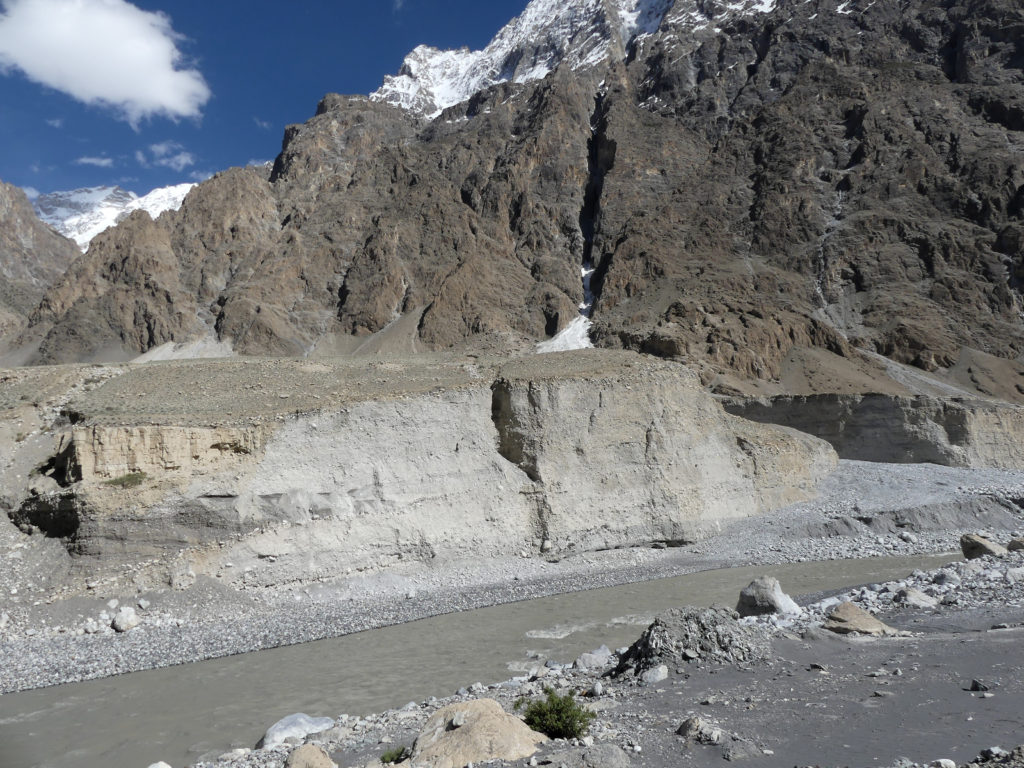 Spectacular scenery of the Karakoram range along the KKH in Upper Hunza
Spectacular scenery of the Karakoram range along the KKH in Upper Hunza
Our first stop was in Khyber village, where Zafar took us to show us the local JamatKhana. There, we met several young people who showed us around the old JK, and then the newer JK that was being built. The facilities were simple and basic, but sufficient. The backdrop around the JK was spectacular with huge snow capped peaks all around.
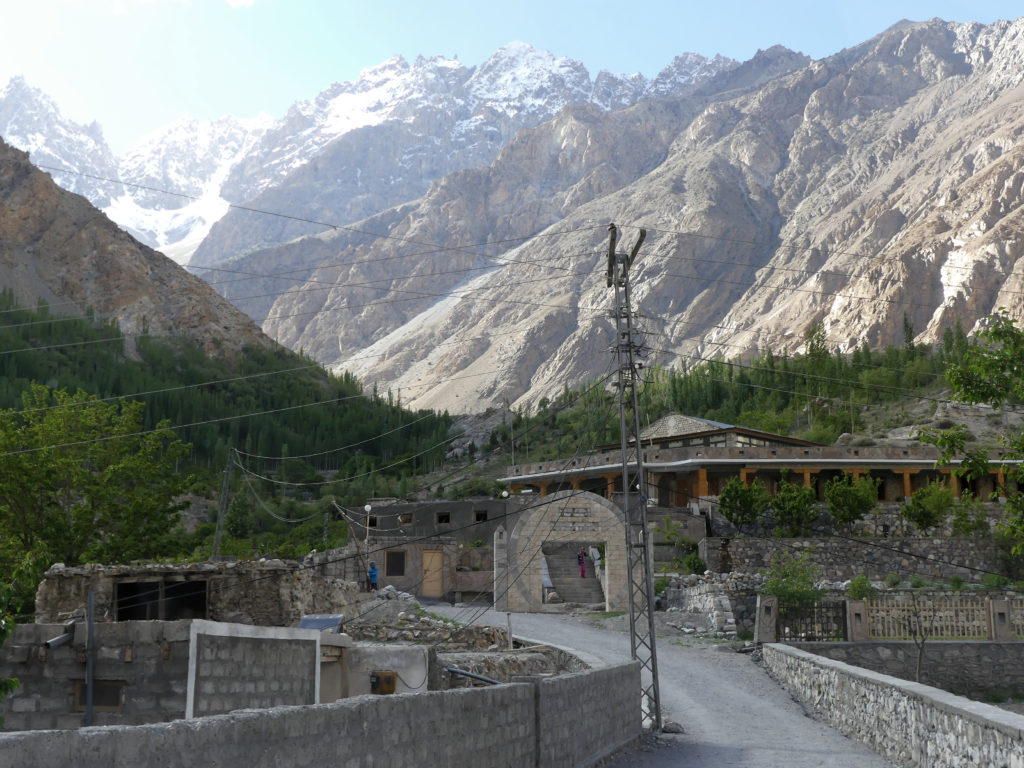 Khyber Village JK, entrance stairs and the new JK under the older JK on top
Khyber Village JK, entrance stairs and the new JK under the older JK on top
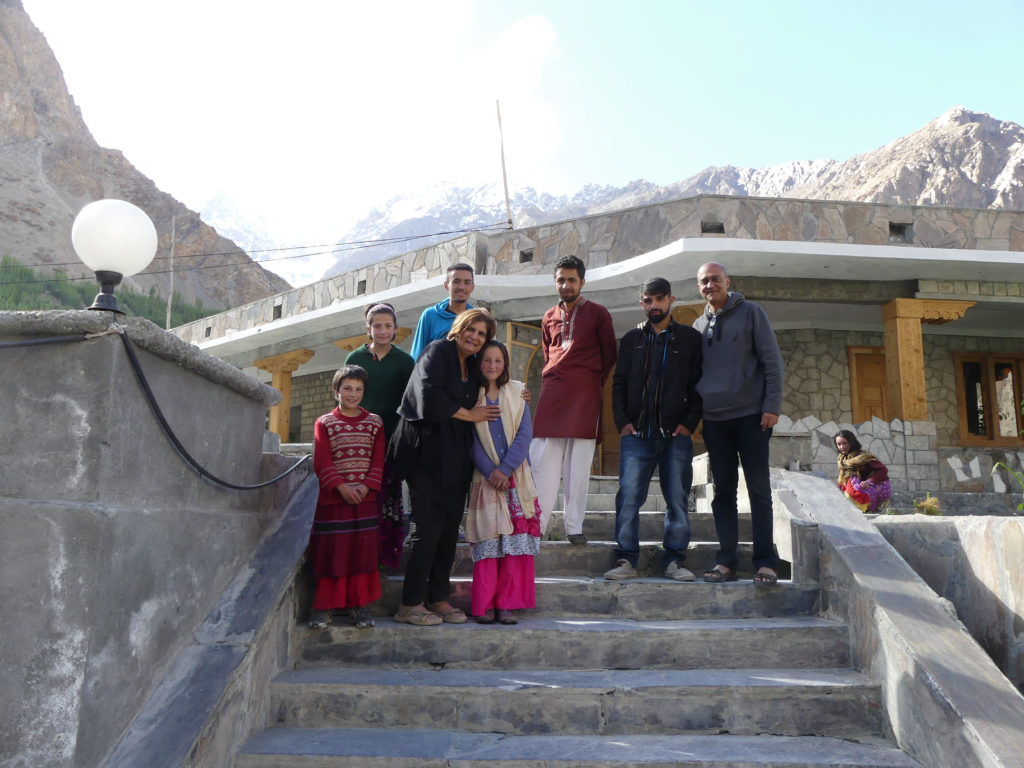 Local village JK with several young people we met there who gave us a tour of the JK
Local village JK with several young people we met there who gave us a tour of the JK
The whole Upper Hunza valley has simply spectacular views; it is truly a Shangri-La. Never experienced such natural beauty anywhere before. Pictures cannot do justice to this spectacular landscape. When we arrived into Passu, we saw the greeting etched on the mountain-side across the Hunza river commemorating His Highness’s visit there in Nov 1987.
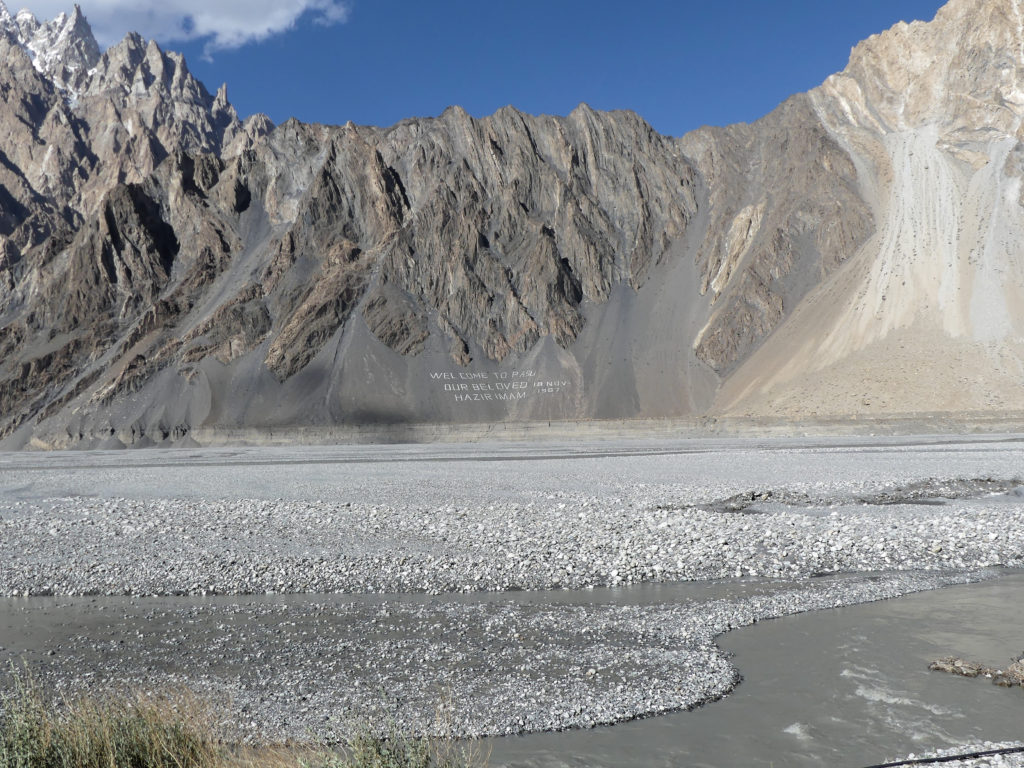 Writing etched into the mountainside commemorating His Highness’s visit in Nov 1987; cathedral peaks to the left
Writing etched into the mountainside commemorating His Highness’s visit in Nov 1987; cathedral peaks to the left
We drove and stopped for the night at the Sarai Silk Lodge in Passu; a basic hotel with spectacular views
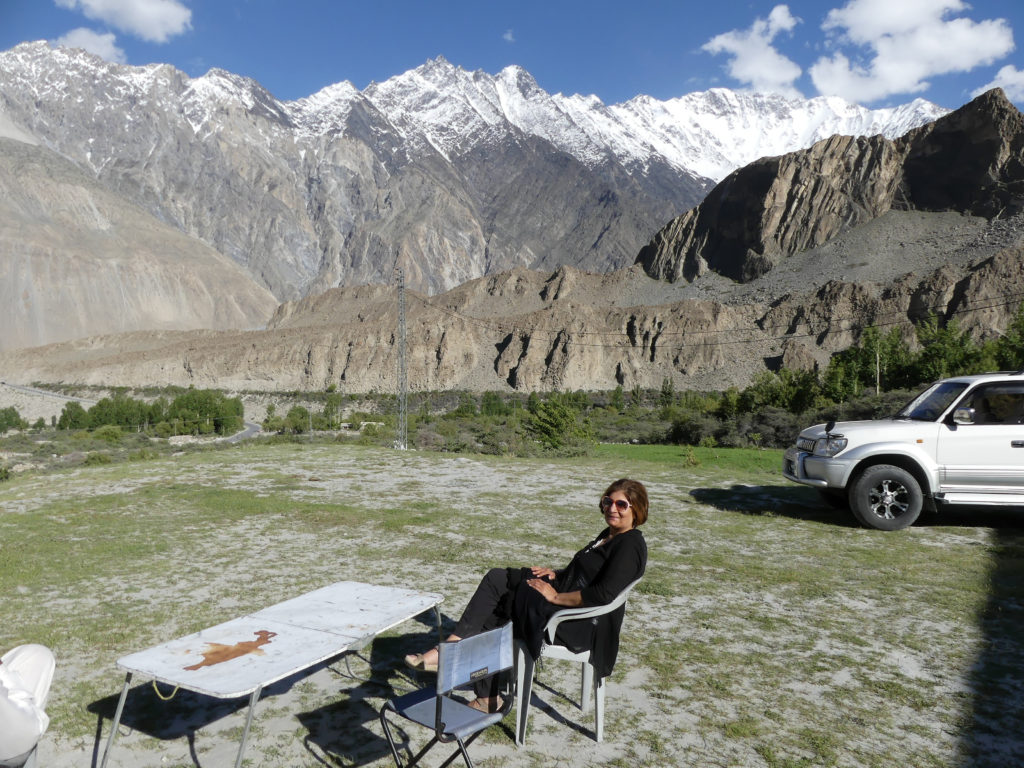 Patio area of the hotel in Passu; magnificent scenery all around
Patio area of the hotel in Passu; magnificent scenery all around
After settling in, Abbas came by and introduced himself as our Guide for the rest of the journey. After discussing our Pakistan trip plans, and a quick dinner, it started getting dark, and it was time for JK. So we drove, then walked over to the Passu JK; by this time, it had got dark rather quickly; I guess the huge mountain peaks all around block a lot of the setting sun’s light; and since there were no street lights around, the cellphone lights came in very handy.
We joined the local Passu Ismaili’s in their very nice, small, JK for evening prayers. The prayer formats were a little different from what we are used to. Several ceremonies and methods were also different. After JK, we met all the locals in the JK compound; got a tour of the facility; there were about 50-60 people in attendance at the JK, and being a small village, everyone knew we had just arrived. They almost all spoke English as they are all 100% literate; and were very hospitable.
Many people invited us to their homes for dinner, tea etc but since we were tired from a long day driving from Tashkurgan, China, we decided to call it a day. Check out our journey from Tashkurgan Drove back to the hotel and when the car was switched off, the whole area was pitch dark; they had no street lights and no light pollution. The beauty of it was that you could easily see the millions of bright stars in the sky; breathtaking.
Hunza district was part of the Kashmir region that India claims, but in the wars after independence, this part of Kashmir came under Pakistan control. Until 1974, Hunza was actually a Princely State, when was dissolved by Zulfiqar Ali Bhutto.
We spent most of the next day in Passu village, before driving to Karimabad (formerly Baltit, also known as Hunza) visiting sites along the way; the whole Hunza area from Khunjerab Pass to Karimabad Is 100% Ismaili.
Passu is a small village of less than 100 households, and all are farming households with cows/sheep/goat rearing. They are a simple, but very friendly and inviting people, and are located on the banks of the Hunza river which starts from a glacier at Khunjerab pass. The homes used to be built with stones and mud adobe, but were improved over time and now are cinder block build.
Inside, the houses have a traditional Tajik design ceiling of squares inside squares, which is supposed to be very good for withstanding earthquakes. As we walked through the village, we met with multiple people and got invited to tea multiple times, but had plans for tea at Zafar’s house and then lunch at Abbas’s house, so could not stop. Very friendly and inviting people all over. We noted that most of the families (full families) were out in their fields working their vegetable fields. This included the council president; see pics
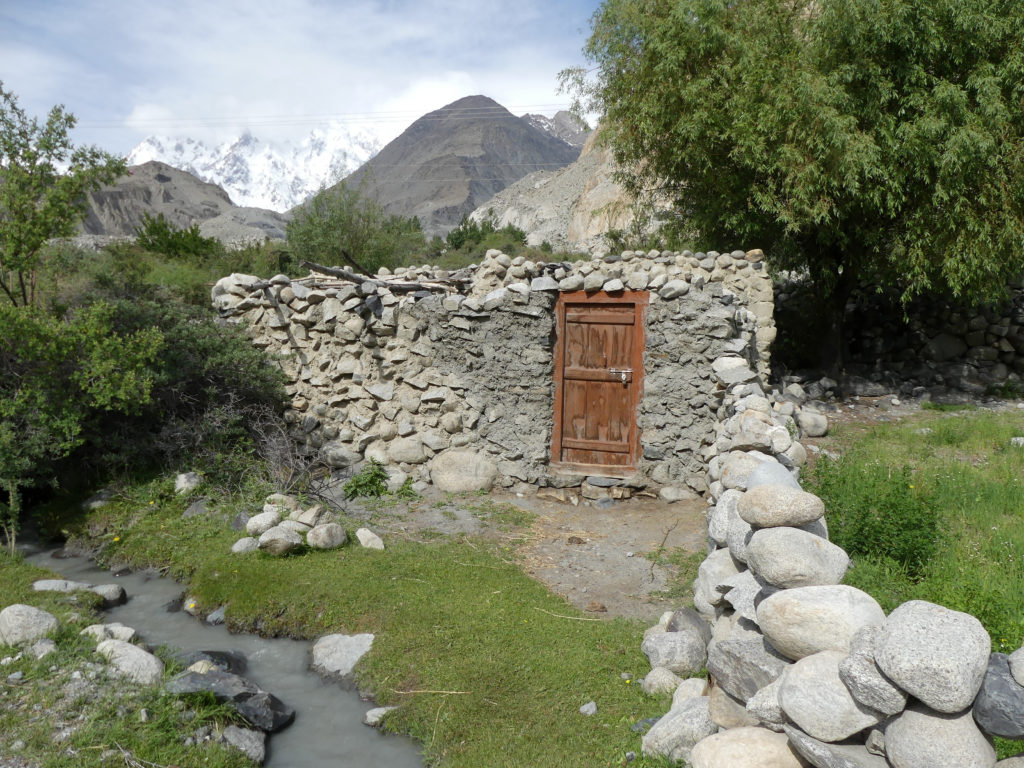 Passu village, typical structure for cattle and food storage. Note the irrigation canal in foreground
Passu village, typical structure for cattle and food storage. Note the irrigation canal in foreground
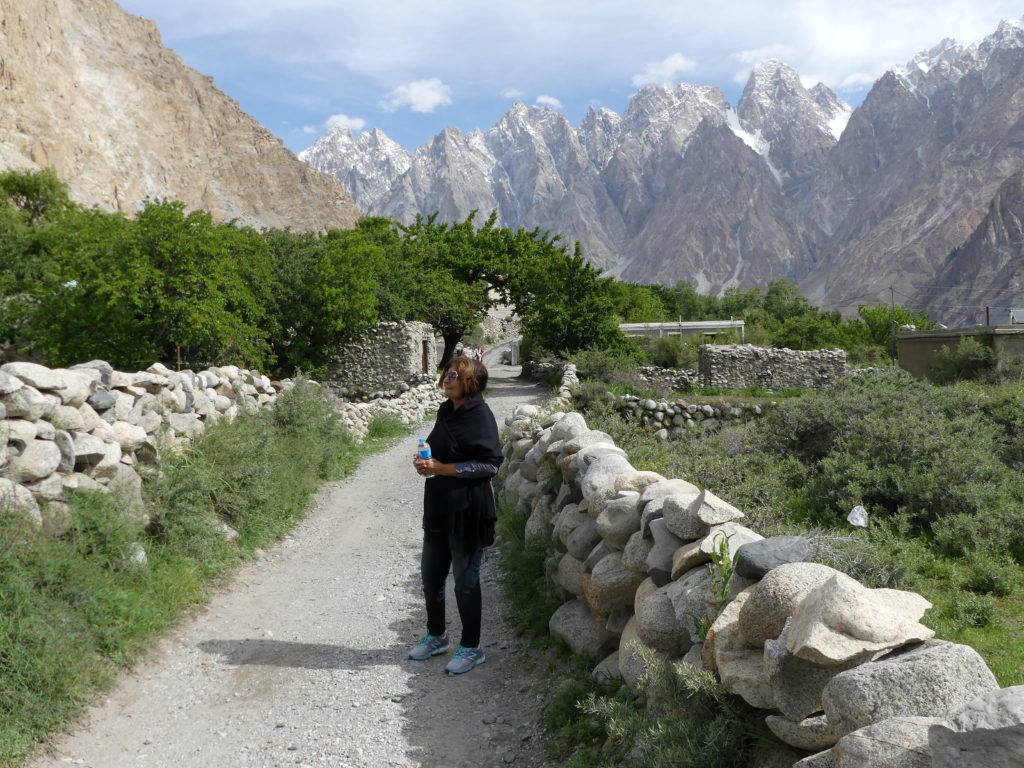 Passu village; note the Cathedral Peaks in the background
Passu village; note the Cathedral Peaks in the background
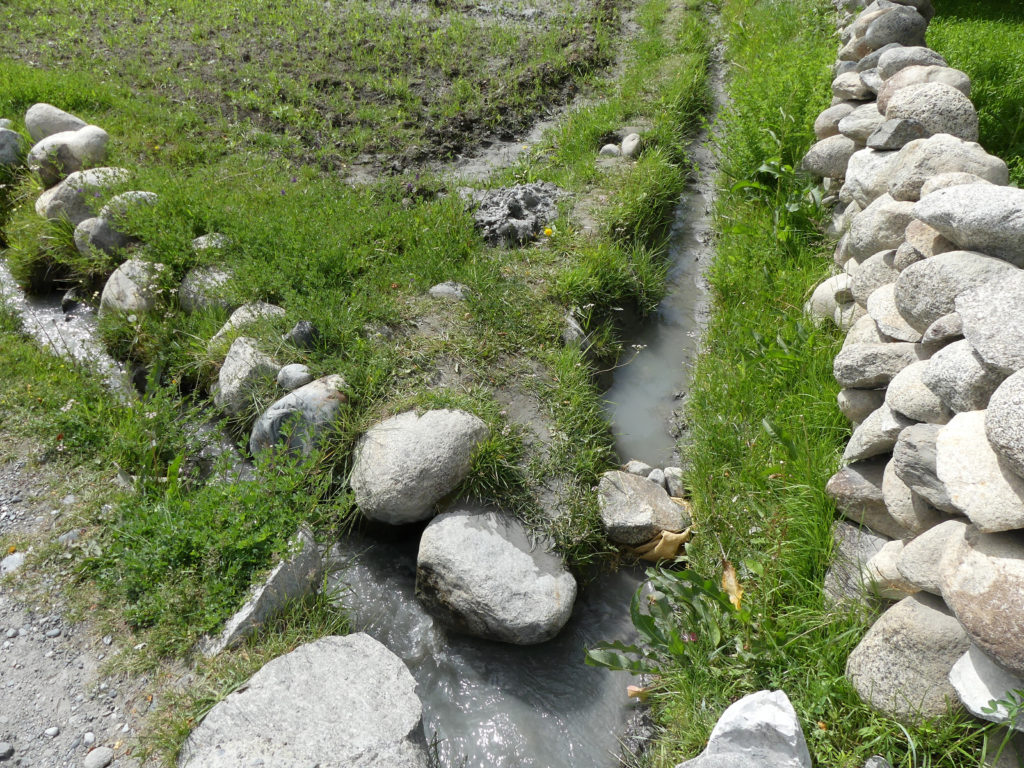 Canals for irrigation, water flows are controlled by the “dam” stones
Canals for irrigation, water flows are controlled by the “dam” stones
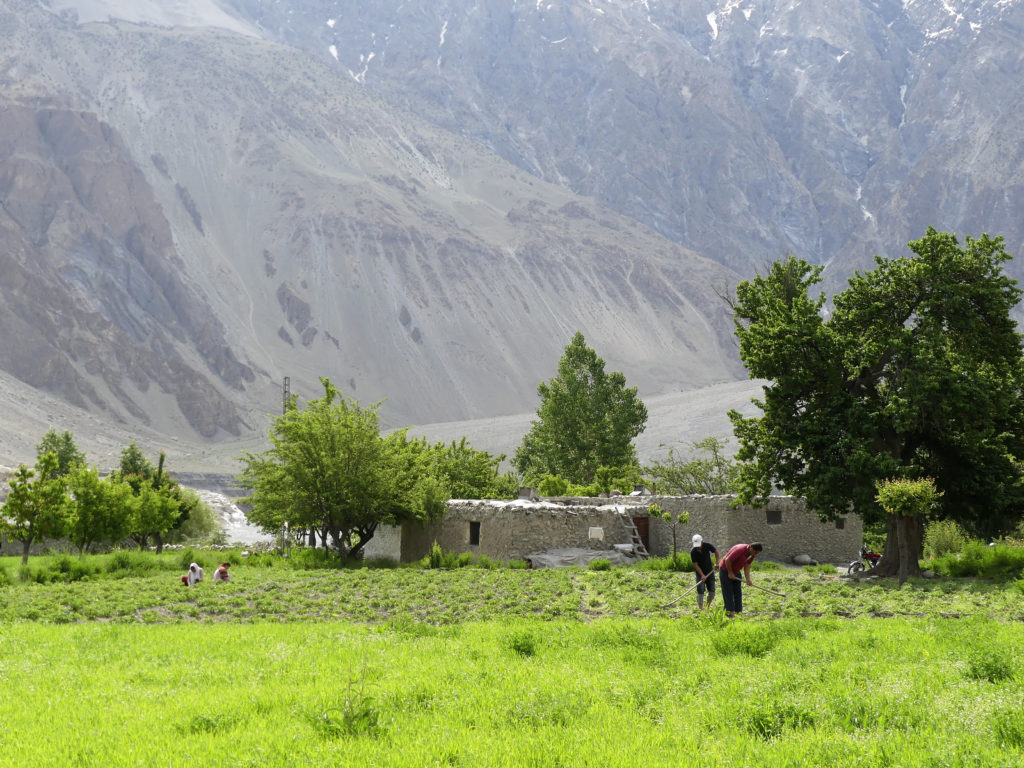 Whole family hard at work; this was the council president (far right), his son, and then his wife and mother (left) all working hard in their potato field
Whole family hard at work; this was the council president (far right), his son, and then his wife and mother (left) all working hard in their potato field
All houses here have clean running water gathered from the glaciers high up, and piped to all houses. In addition, water channels were dug by the villagers from lower down the glaciers to bring irrigation water to all the farms, by gravity. Every small plot for growing crops was irrigated; simple but very effective.
Each home also has a septic tank, and electricity from micro and macro power stations. A lot of this basic infrastructure development was brought about by AKRSP since 1980’s. But there is NO internet here, and cellular service is by a localized carrier, so no TMobile service here. I was unconnected for 2 days, but felt good 🙂
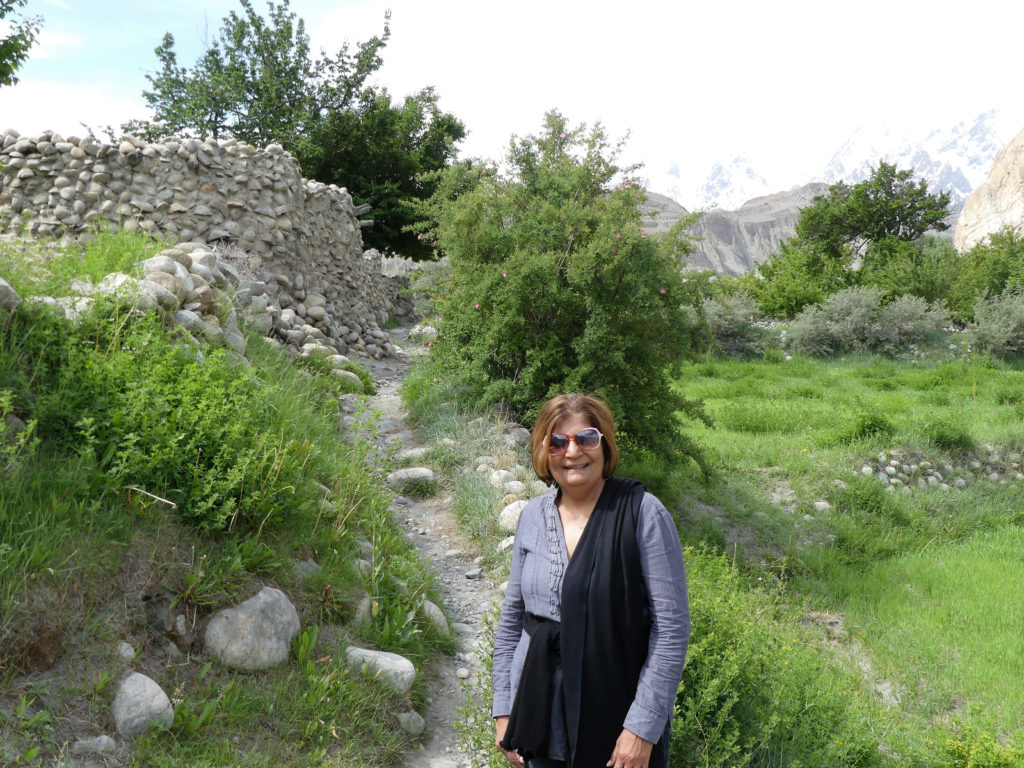 Old Silk road path through Passu village
Old Silk road path through Passu village
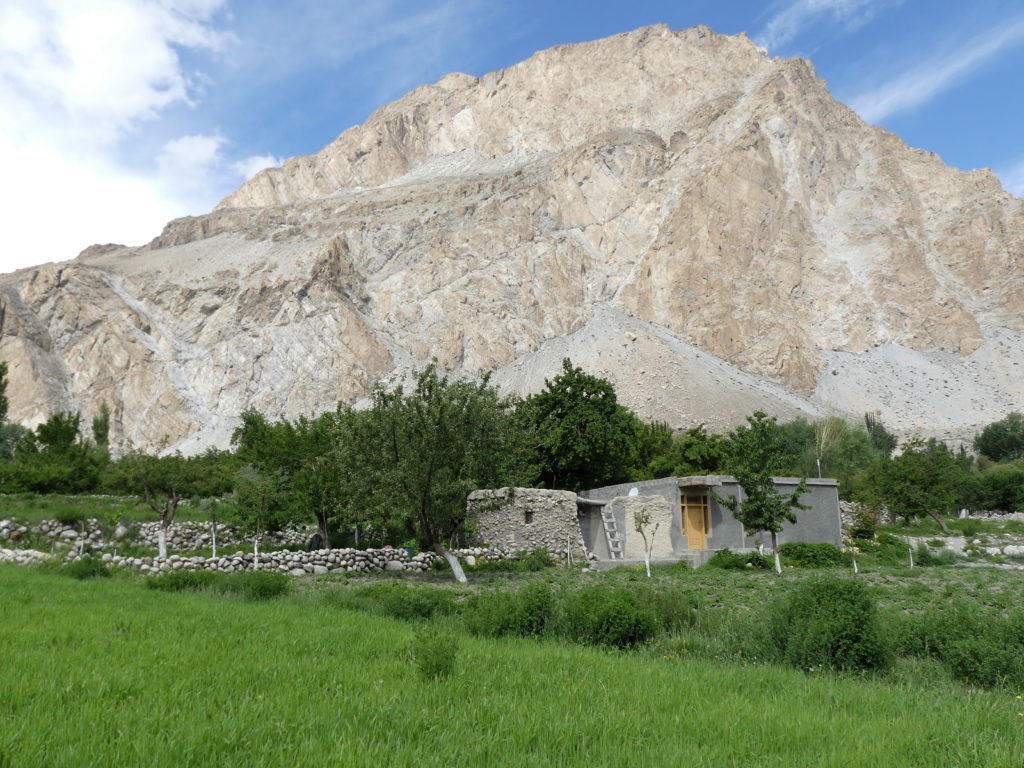 Typical house, shed for animals and food, and yard/farm fenced off
Typical house, shed for animals and food, and yard/farm fenced off
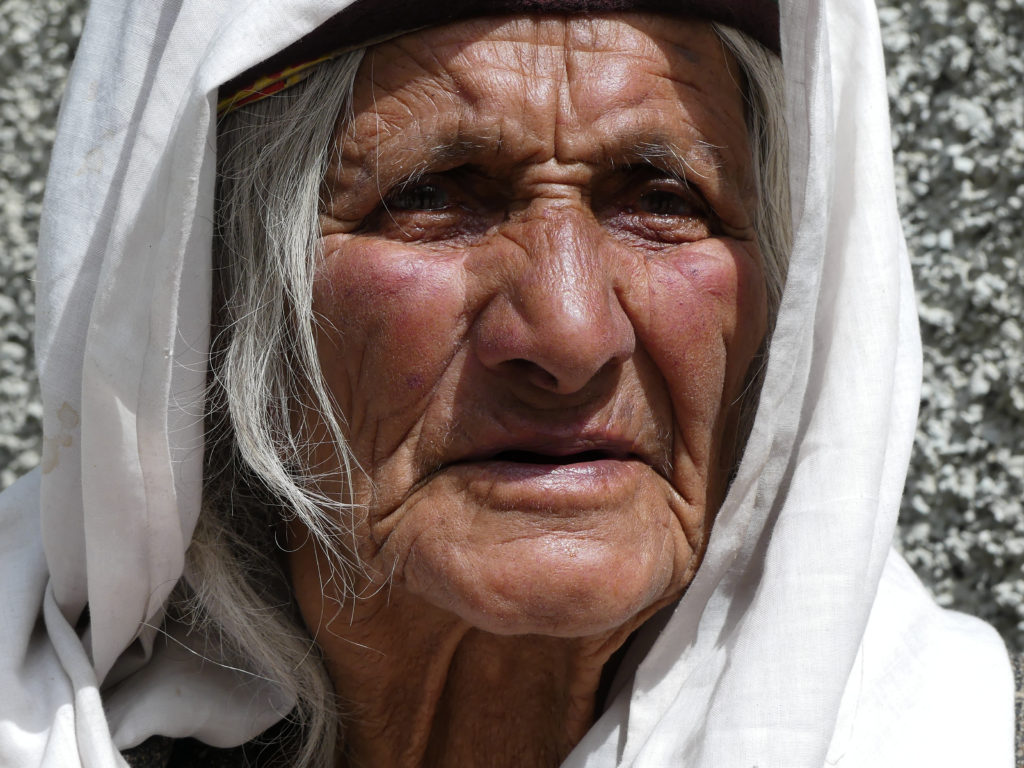 Grandma was enjoying the sun with her grandson
Grandma was enjoying the sun with her grandson
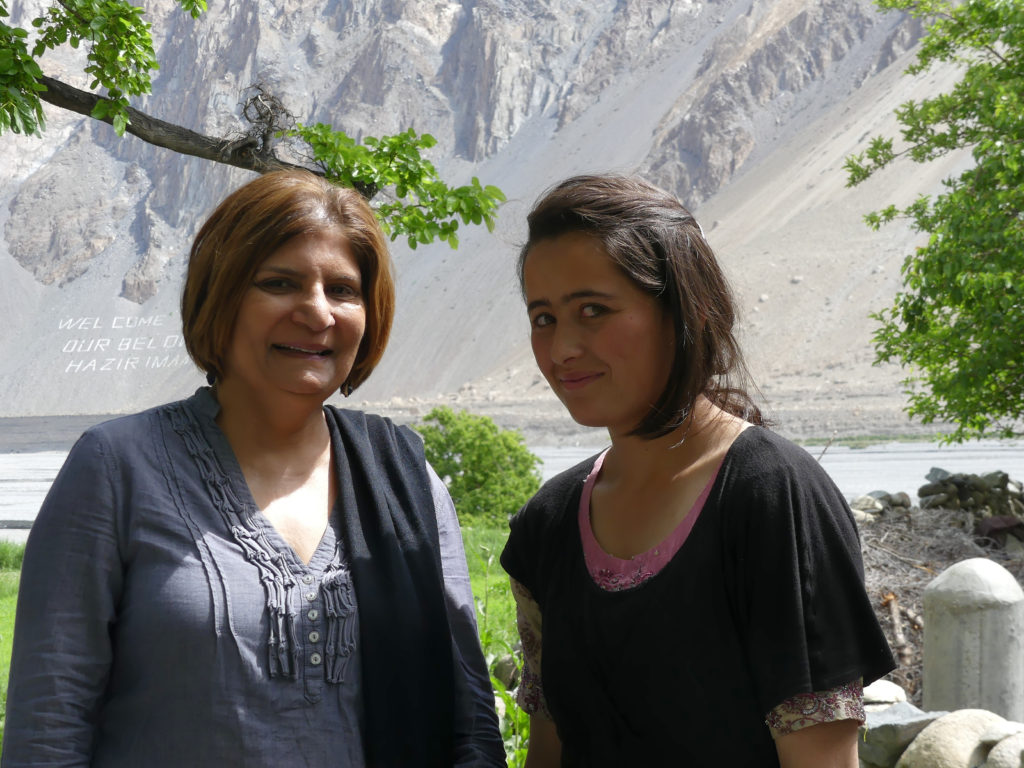 Young lady was back from High School for vacation
Young lady was back from High School for vacation
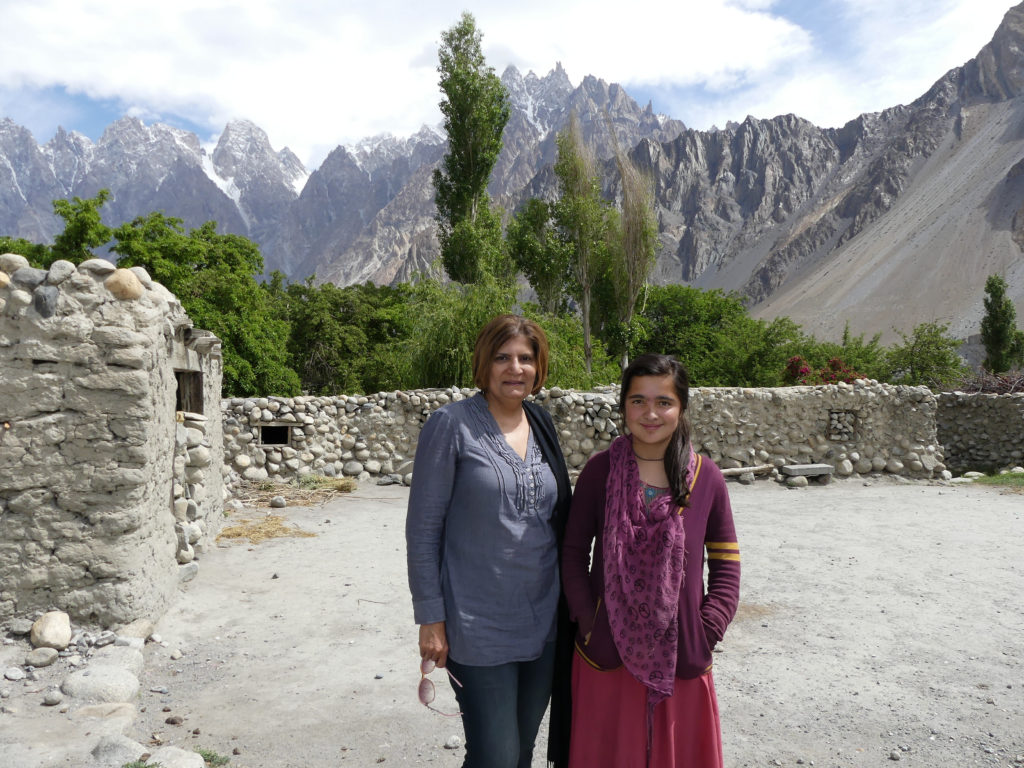 Another young villager back from High School for vacation
Another young villager back from High School for vacation
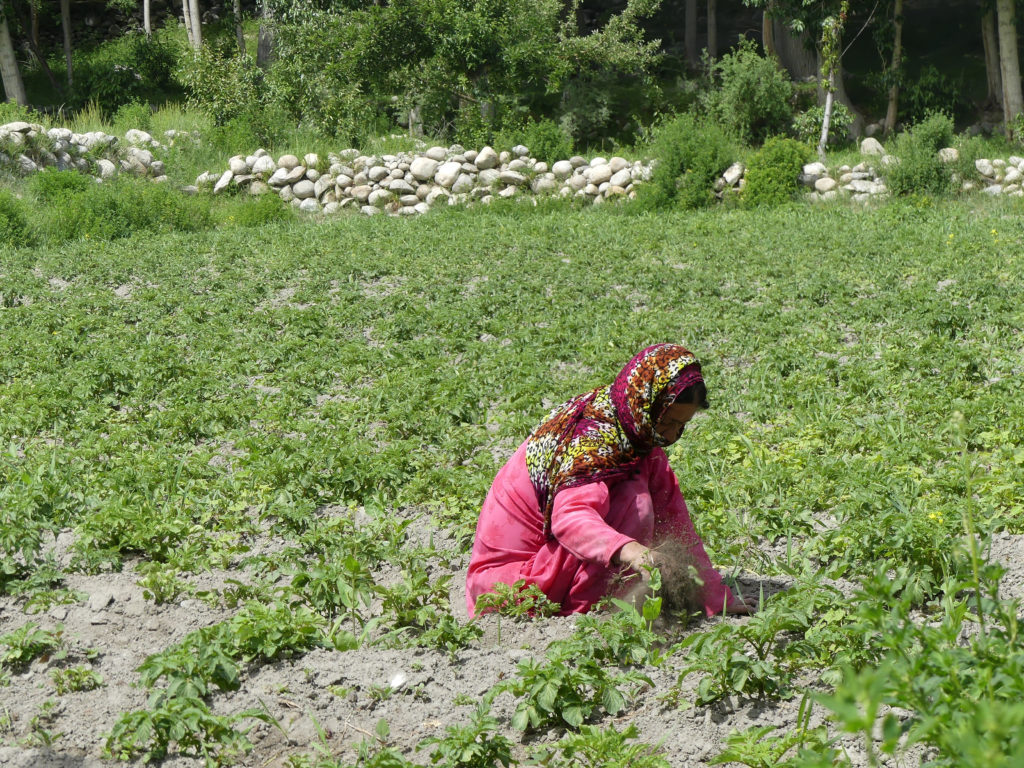 The ladies in Passu work very hard; they take care of the house, cooking/cleaning, the kids, the in-laws, the cattle/goats/sheep (daily cleaning, taking out to pasture, herding back at night), the farm work (planting, weeding, watering, harvesting). And they never complain, always smiling. Next time Dilshad Karim complains about how hard she works, I will remind her of these Hunza women 🙂
The ladies in Passu work very hard; they take care of the house, cooking/cleaning, the kids, the in-laws, the cattle/goats/sheep (daily cleaning, taking out to pasture, herding back at night), the farm work (planting, weeding, watering, harvesting). And they never complain, always smiling. Next time Dilshad Karim complains about how hard she works, I will remind her of these Hunza women 🙂
That begs the question; what do the men here do? Since the women do all the work around the home, farm, cattle, and family; there needs to be some money income coming in for other basics. So the men find work elsewhere to make money. So for example, Zafar was our driver and Abbas was our guide for 2 weeks during our trip thru Gilgit-Baltistan province
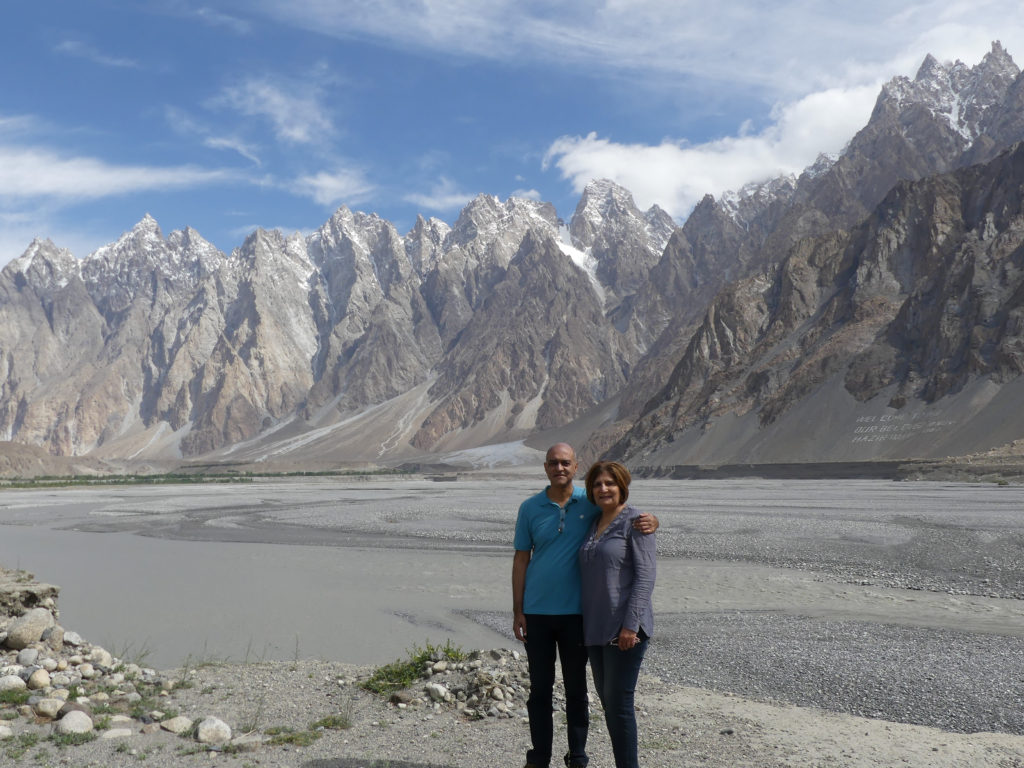 Hunza river and the Cathedral Peaks in the background
Hunza river and the Cathedral Peaks in the background
This area is well known for long life expectancy, in addition to its breathtaking natural beauty; the essential Shangri-La. We went to visit the oldest person living in Passu, Mr. Zahoor Muhammed Alvi, who was 108yrs old. In this area, everyone is familiar with everyone else, and there is no formality; if you want to visit someone, you don’t need an invitation into their home; you just go there and enter their home.
This is how we simply walked in uninvited to visit the oldest man in Passu. He sat up in bed to meet us and talked to us in Wahi. We were served tea/hot milk by his family and chatted for a while. He is not very active now, but still goes to the bathroom by himself; no help needed. Healthy indeed. I have never met anyone quite that old, so another first for me. Mr. Zahoor gifted me a Hunza hat; it was something I had wanted to purchase anyway, so it was very kind of him to gift it to me. Something I will never forget. So very kind and giving people here.
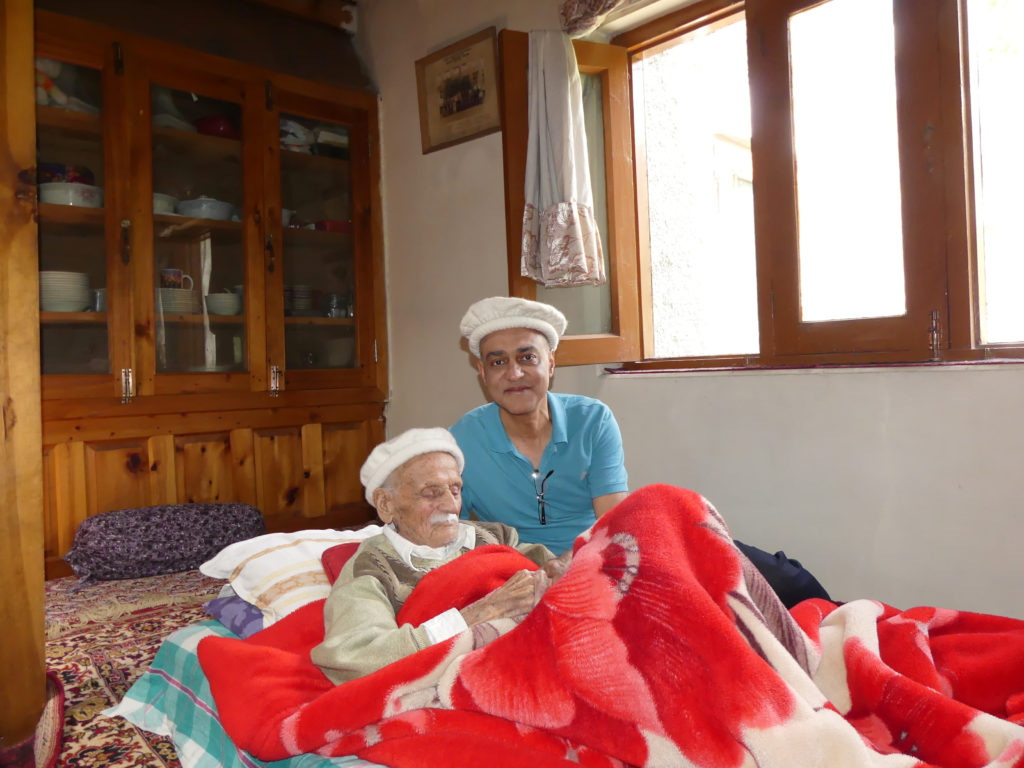 Zahoor Muhammed Alvi; 108yrs old. The oldest man in Passu, and the oldest man I have ever met. He gifted me a Hunza hat; I will never forget him.
Zahoor Muhammed Alvi; 108yrs old. The oldest man in Passu, and the oldest man I have ever met. He gifted me a Hunza hat; I will never forget him.
Then we went and visited an Early Chidlhood Development center run by the AKES; where they had kindergarten to grade 3 kids.
We received a demonstration of healthy personal hygiene by the children of ECD II
Next, we walked over to the JK to take some pictures, as the previous night, it had been dark.
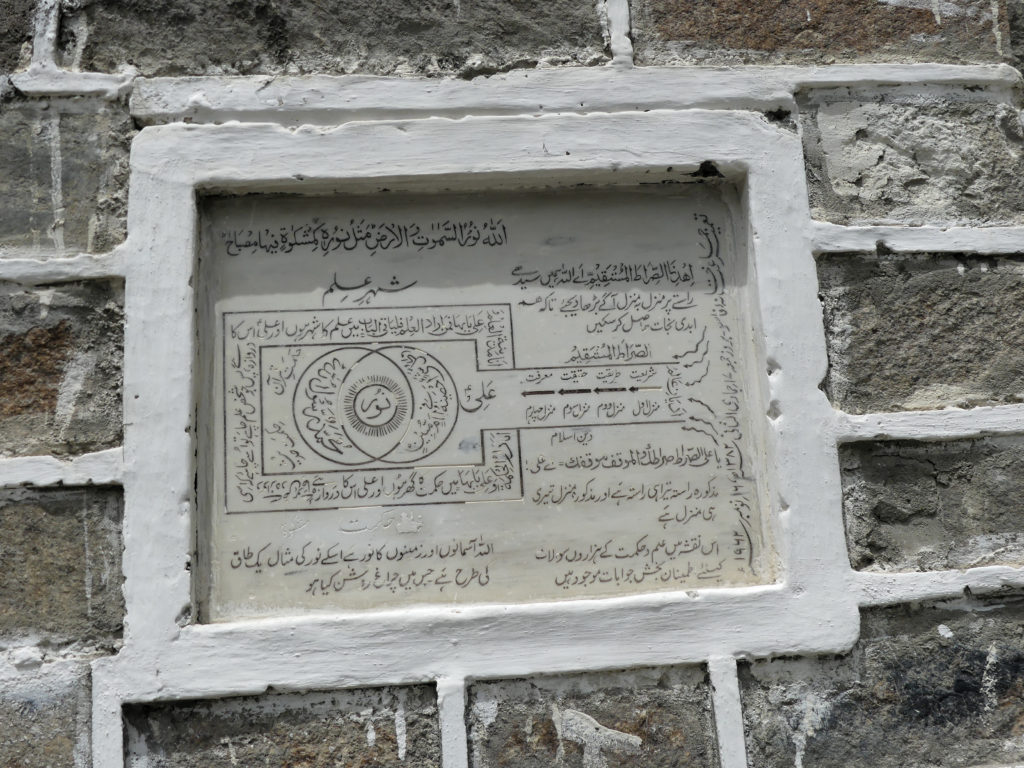 Inscription on the mosque compound wall
Inscription on the mosque compound wall
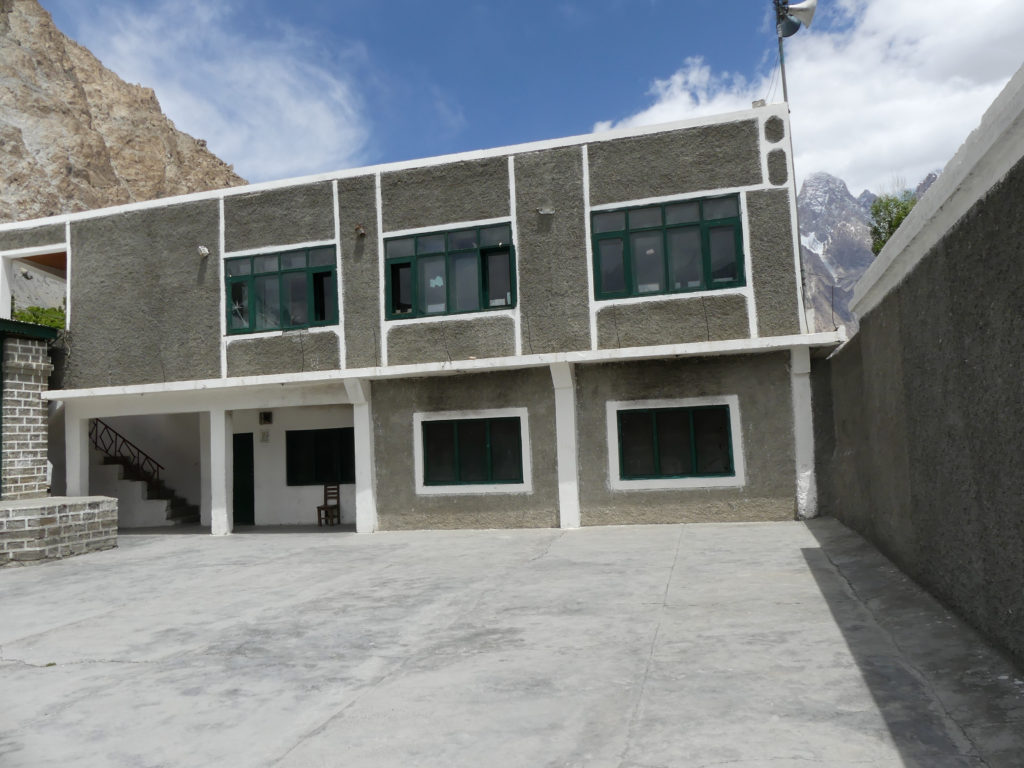 REC Classrooms, Kitchen, Social hall etc in JK compound
REC Classrooms, Kitchen, Social hall etc in JK compound
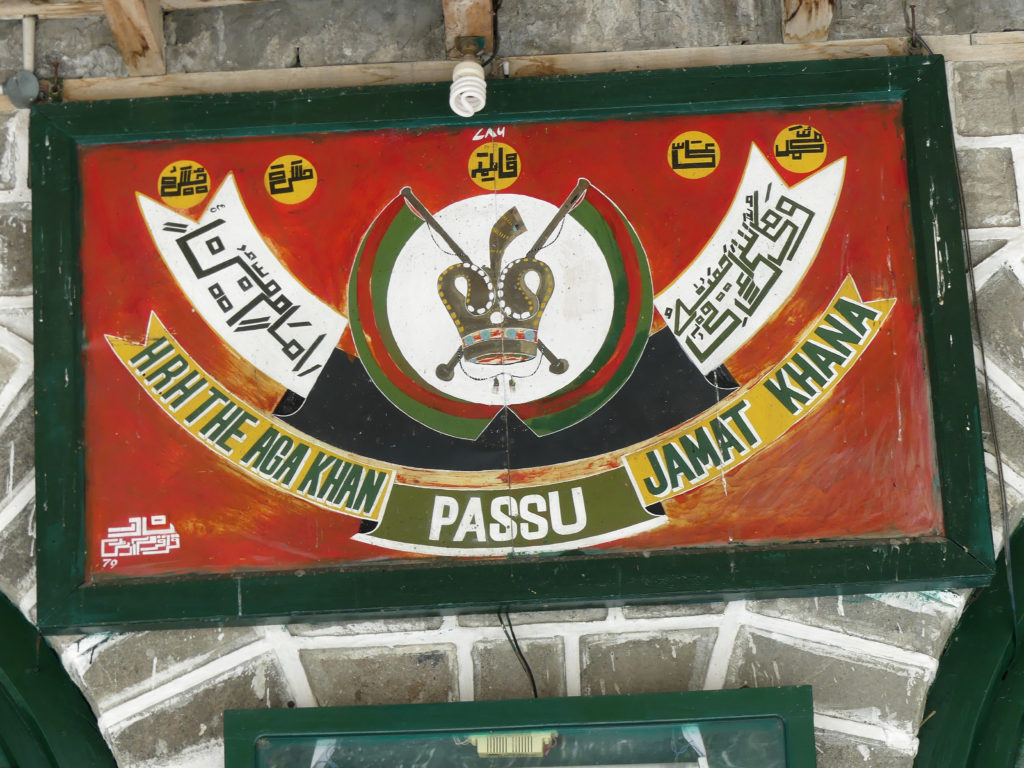 We also visited the Middle school which was founded by a Japanese lady that is run by AKES, that goes from grade 4-8; after which, kids have to go to boarding high schools in larger towns like Karimabad or Gilgit.
We also visited the Middle school which was founded by a Japanese lady that is run by AKES, that goes from grade 4-8; after which, kids have to go to boarding high schools in larger towns like Karimabad or Gilgit.
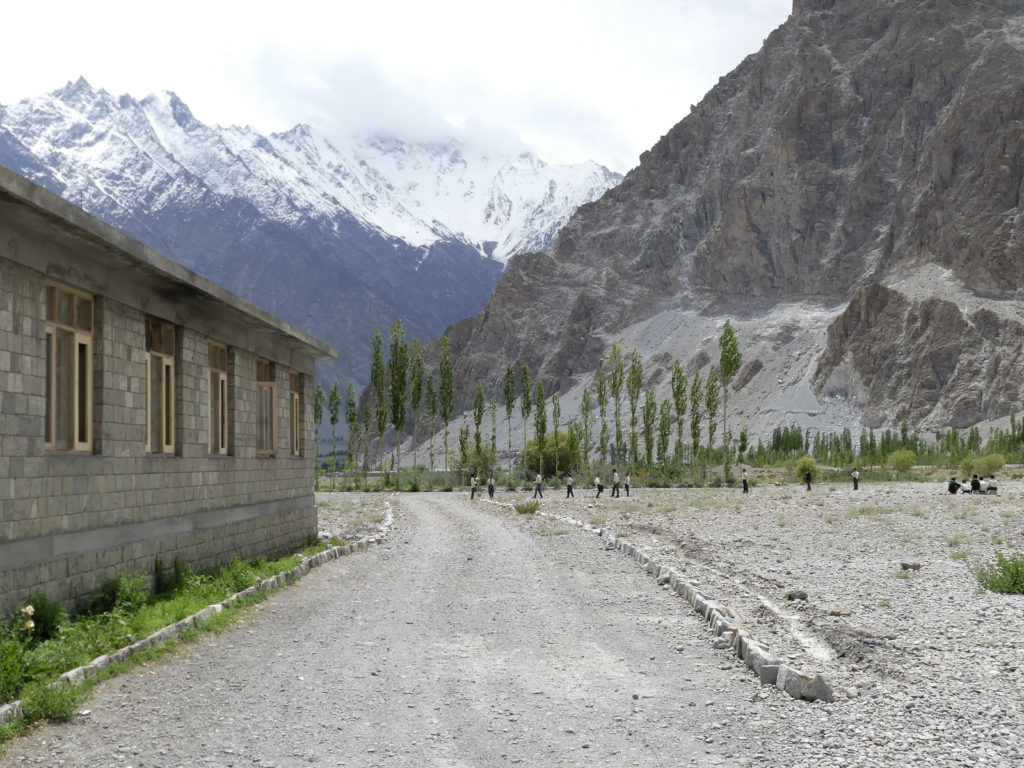
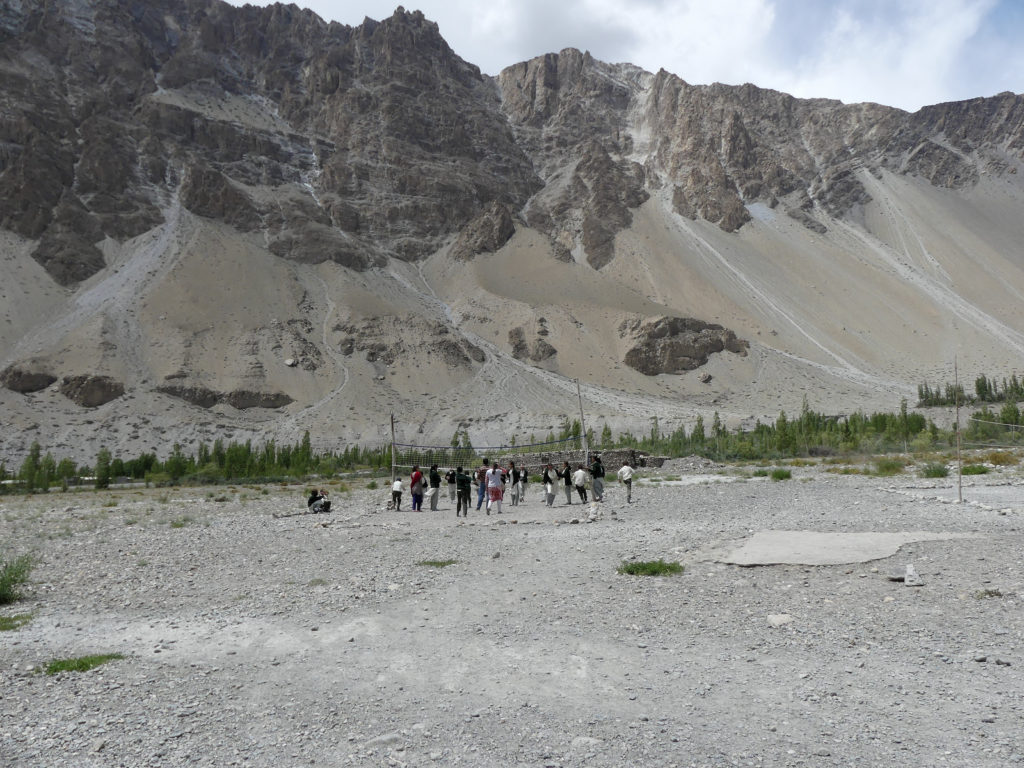
School compounds and Recreation areas; football and volleyball during recess
In between, we stopped for tea at Zafar’s house. Zafar’s father is 92, and still works in the farm, daily doing manual labor. Amazingly strong mountain people. Tea was traditional “choi” (or namak tea); which is tea, and you stir it with a big piece of rock salt, to add salt to the tea. More you stir, the more salt you get in your tea. This is typical mountain tea.
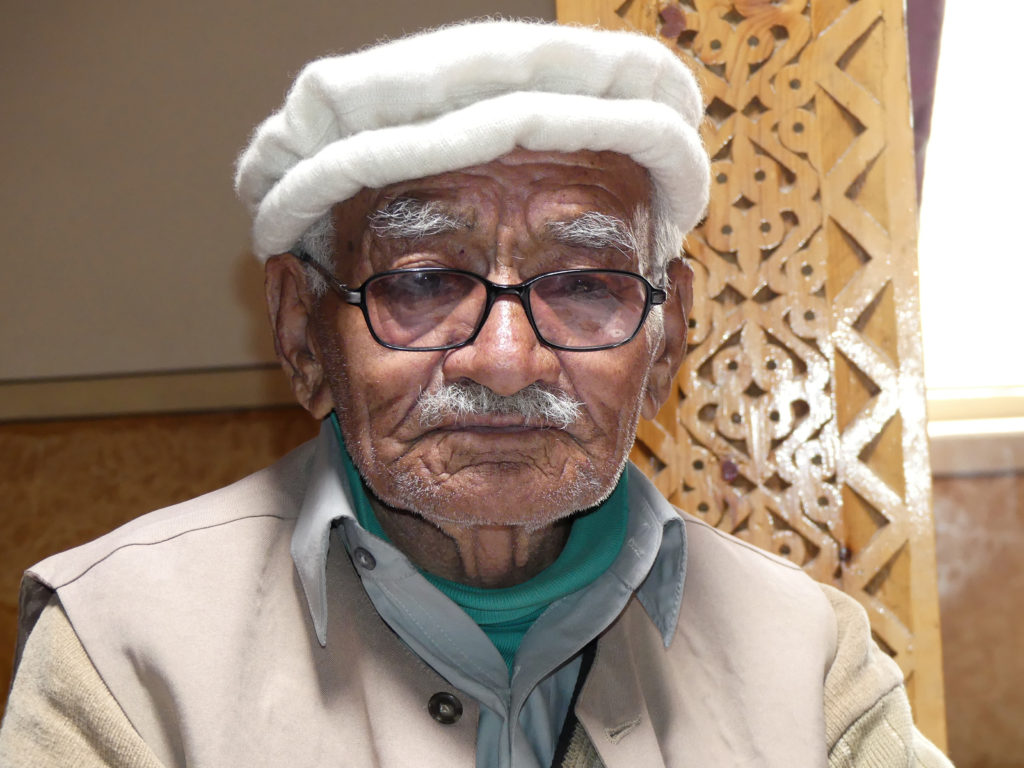 Zafar’s 92yr old father, who still works the fields manually every day
Zafar’s 92yr old father, who still works the fields manually every day
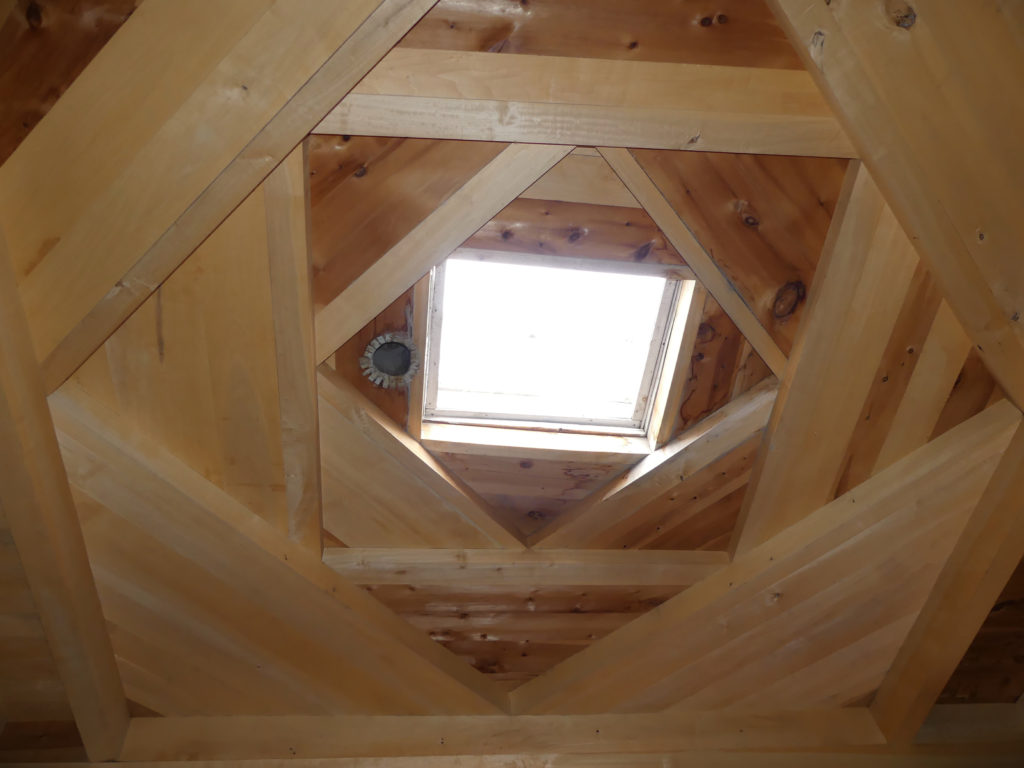 Typical Tajik interior ceiling design; skylight for light and ventilation and the round hole on side for chimney in winter for the stove for heating. The square in square design is meant to help withstand earthquakes
Typical Tajik interior ceiling design; skylight for light and ventilation and the round hole on side for chimney in winter for the stove for heating. The square in square design is meant to help withstand earthquakes
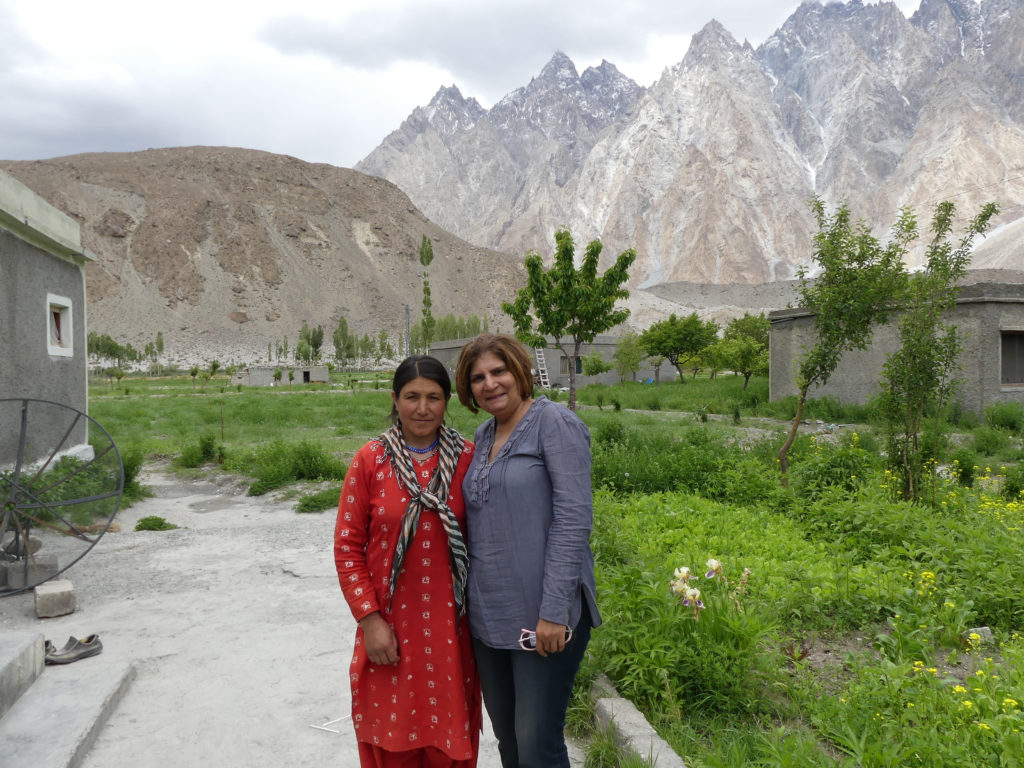 With Zafar’s wife outside their home and farm
With Zafar’s wife outside their home and farm
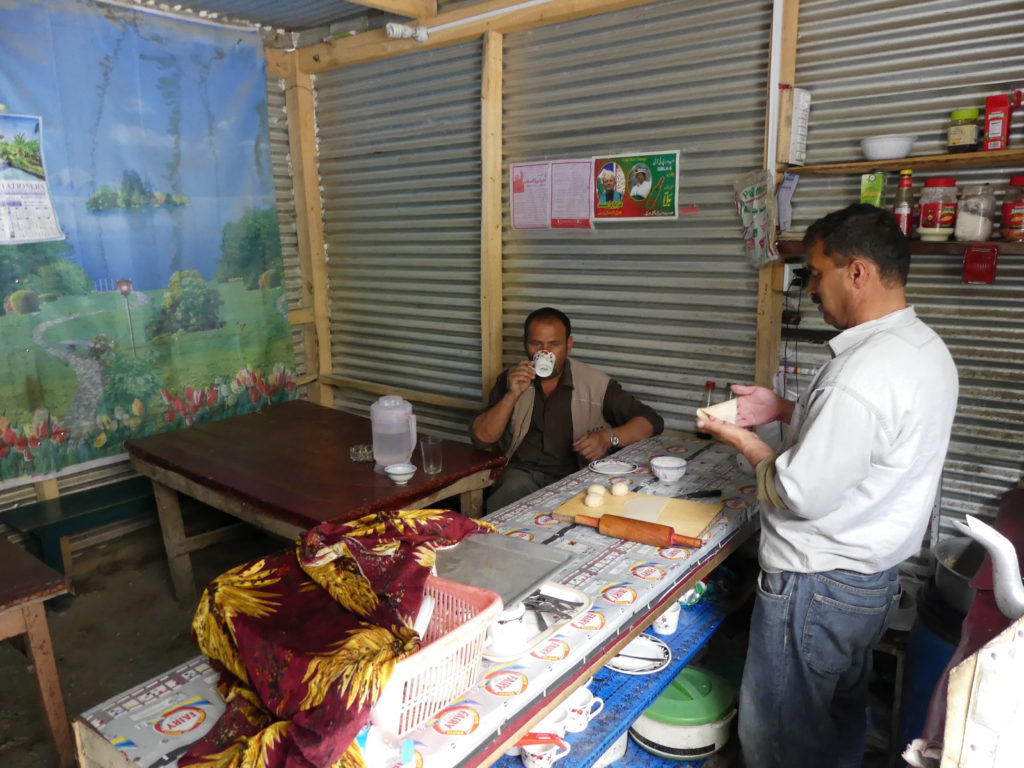 Samosa stop in Passu. Samosas are made mostly with potatoes; yummy
Samosa stop in Passu. Samosas are made mostly with potatoes; yummy
Lunch was at Abbas’s house; where his wife, Joshan, had cooked up a big lunch for us; including typical apricot based pancakes, nan, vegetable curry (okra, potato, onion), daal and pilau. What a feast. They grow a lot of potato’s here, and store them for use all winter as a high energy food; my kind of food :). Abbas’s father is also 92, and always active. Both he and Zafar’s father had fought for Pakistan in the Kashmir war after independence.
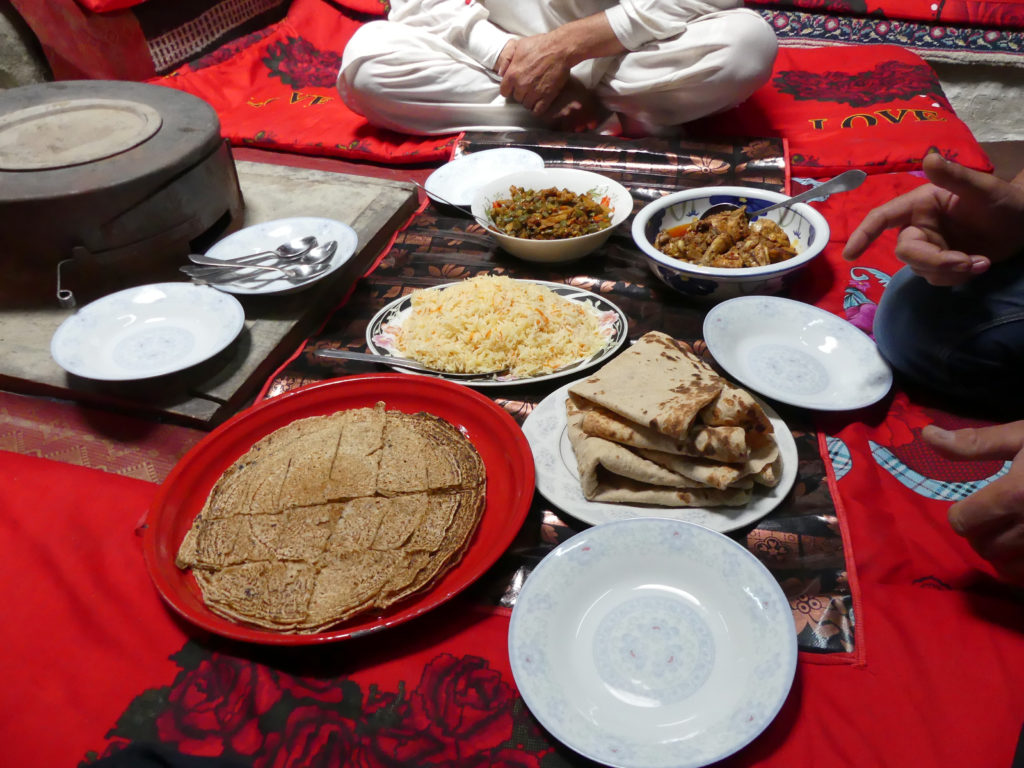 Lunch feast prepared by Abbas’s wife Joshun (Apricot type pancakes, Nan, Rice, vegetable curry and meat curry)
Lunch feast prepared by Abbas’s wife Joshun (Apricot type pancakes, Nan, Rice, vegetable curry and meat curry)
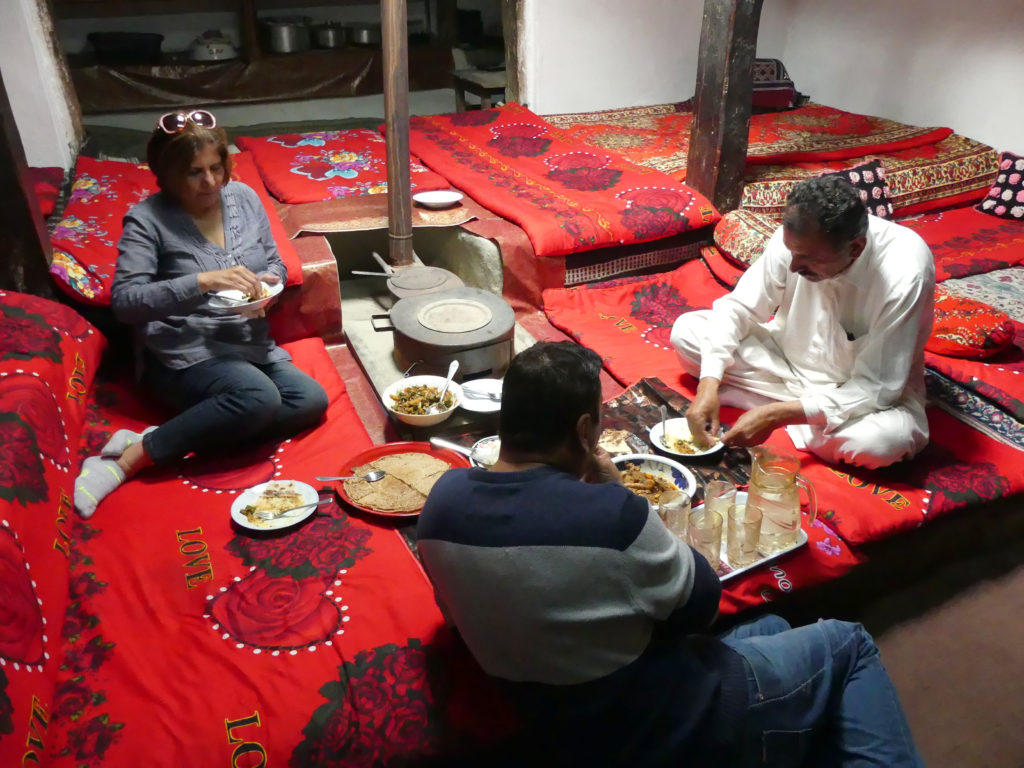 Interestingly, the houses in Hunza were surprisingly similar in layout and eating/sleeping arrangements as in Xinjiang, China. In general, very simple and functional, with no trappings
Interestingly, the houses in Hunza were surprisingly similar in layout and eating/sleeping arrangements as in Xinjiang, China. In general, very simple and functional, with no trappings
An absolutely wonderful time spent in Passu; with the friendliest and warmest people.
Next, Drive to Karimabad, touring Karimabad, and then onto Gilgit and beyond.
Silk Road 9: karakorum Highway next
This entry was posted in Asia, Pakistan, Silk Road Pakistan June 2016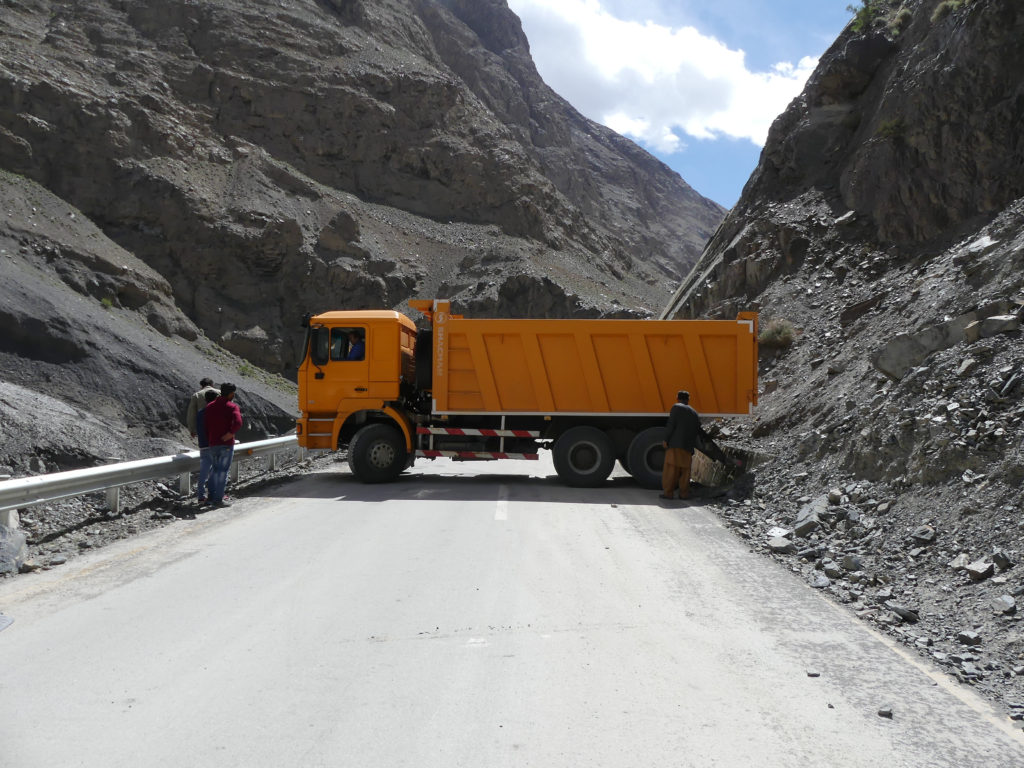
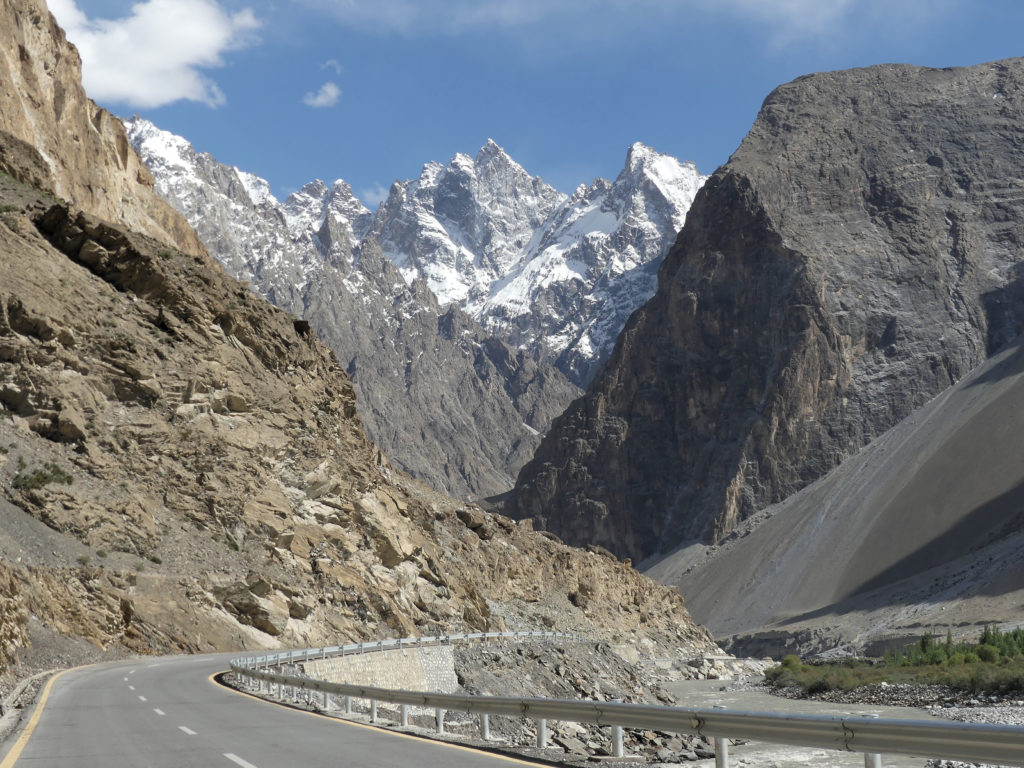
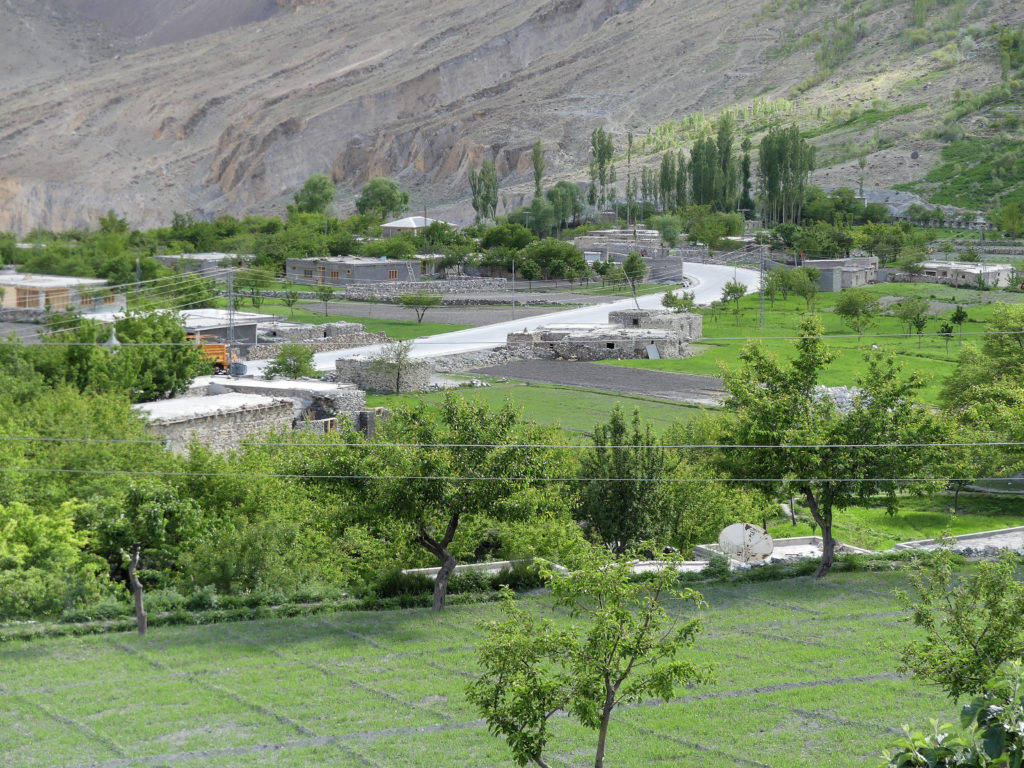

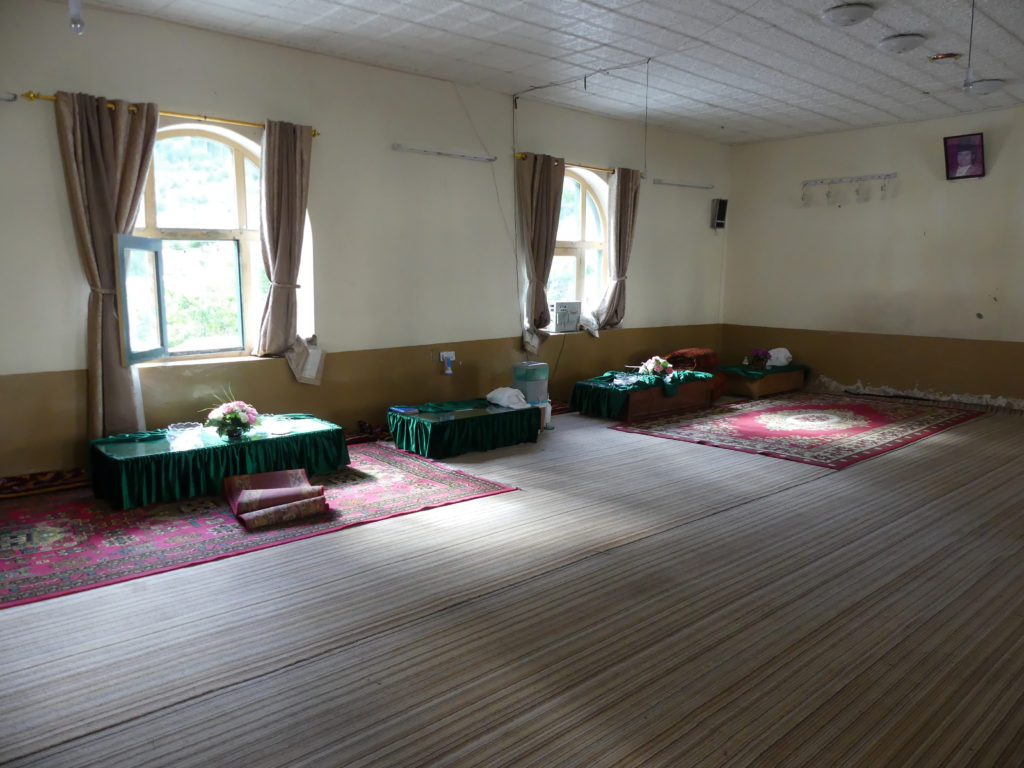
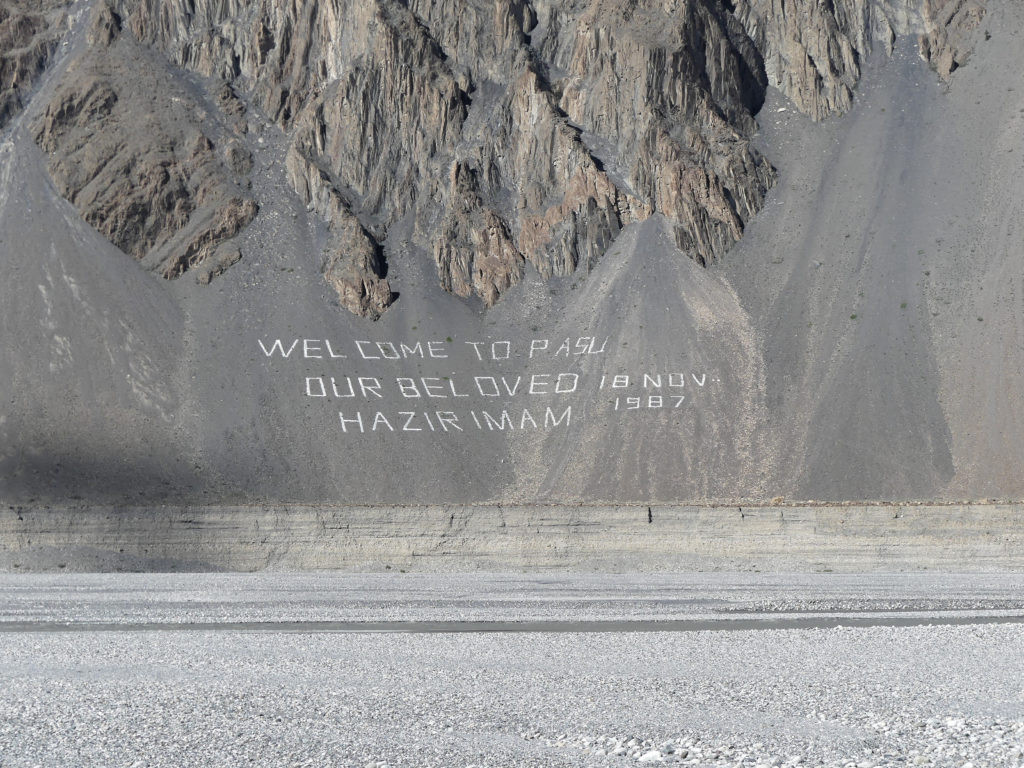
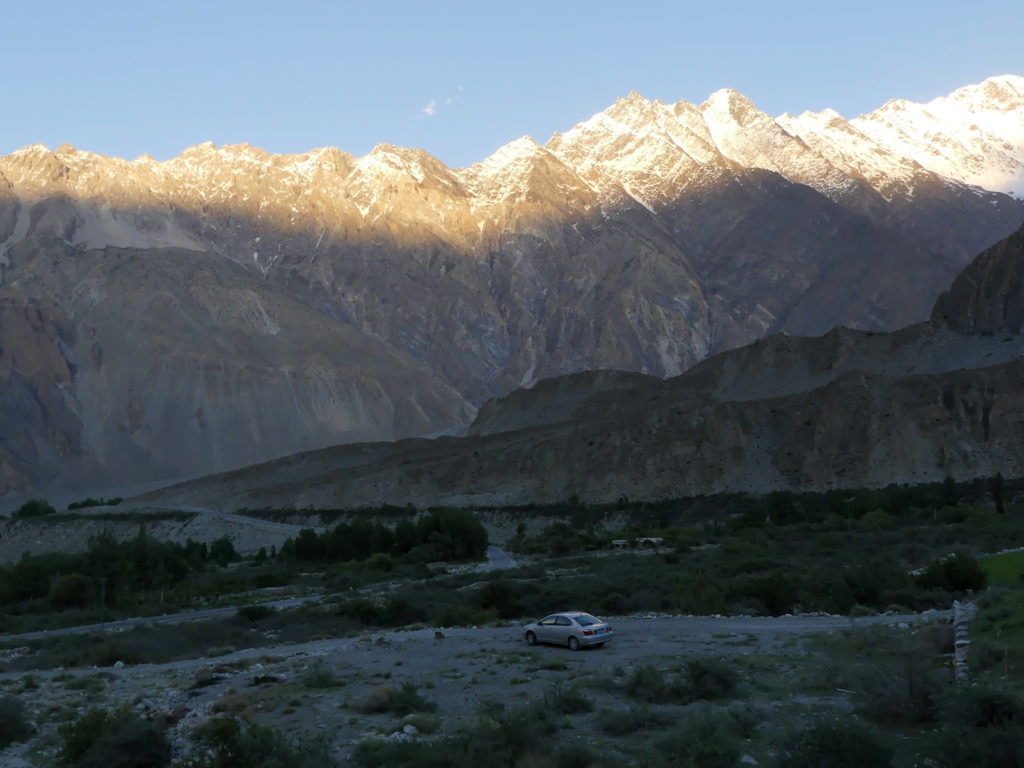
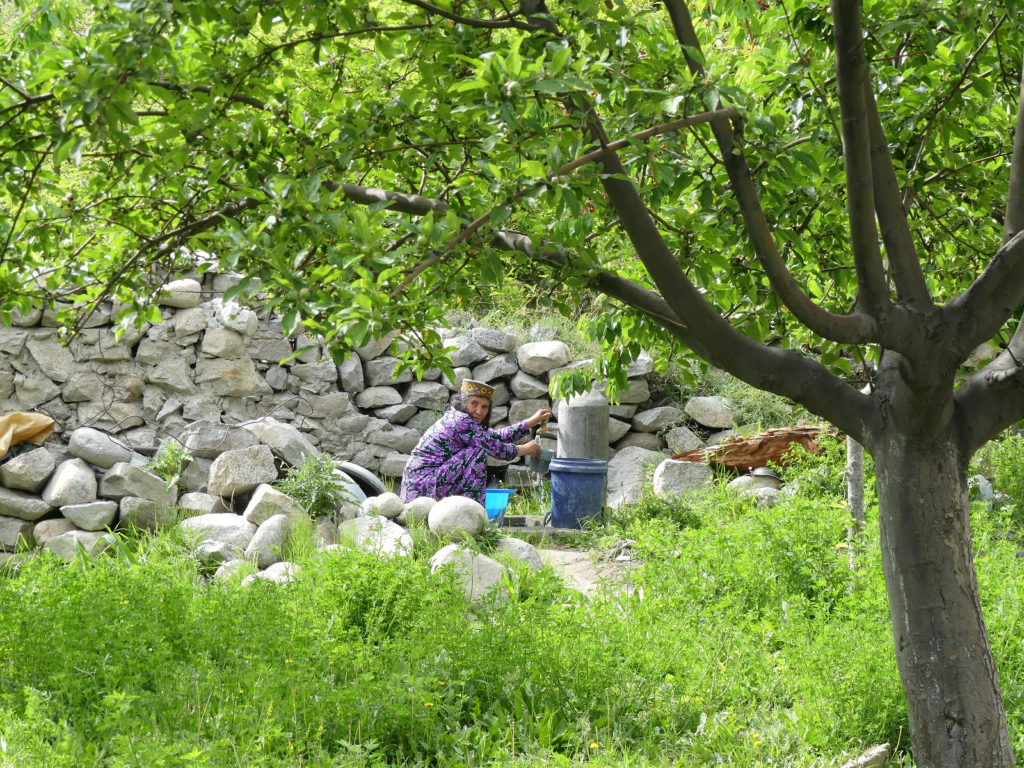
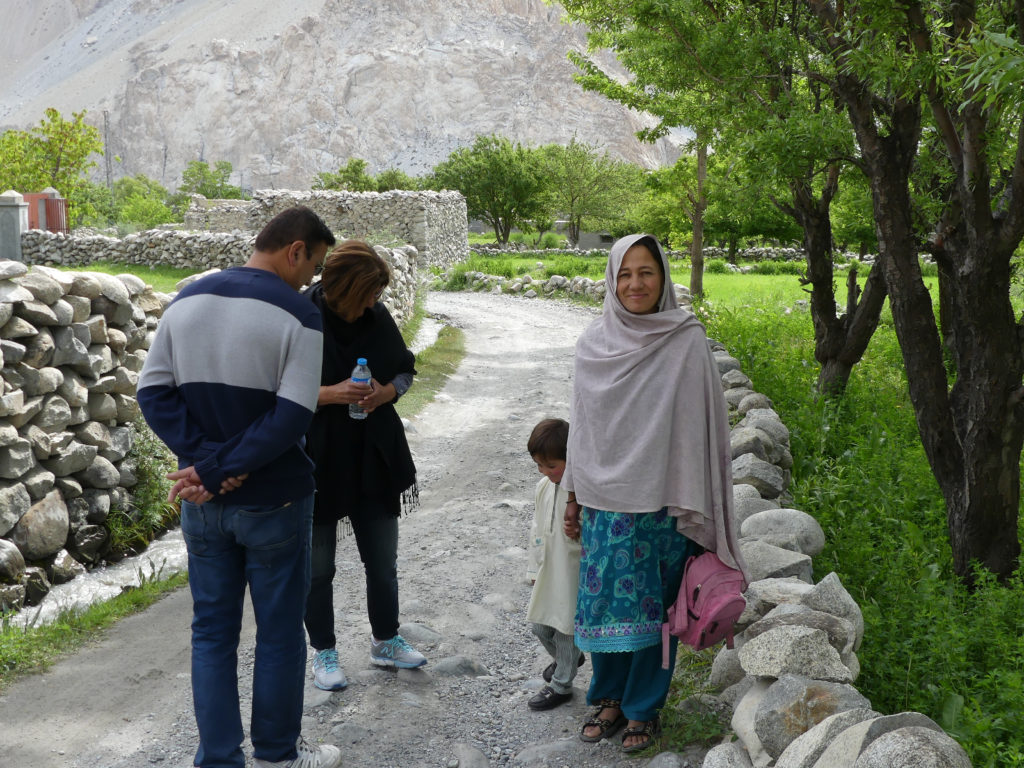
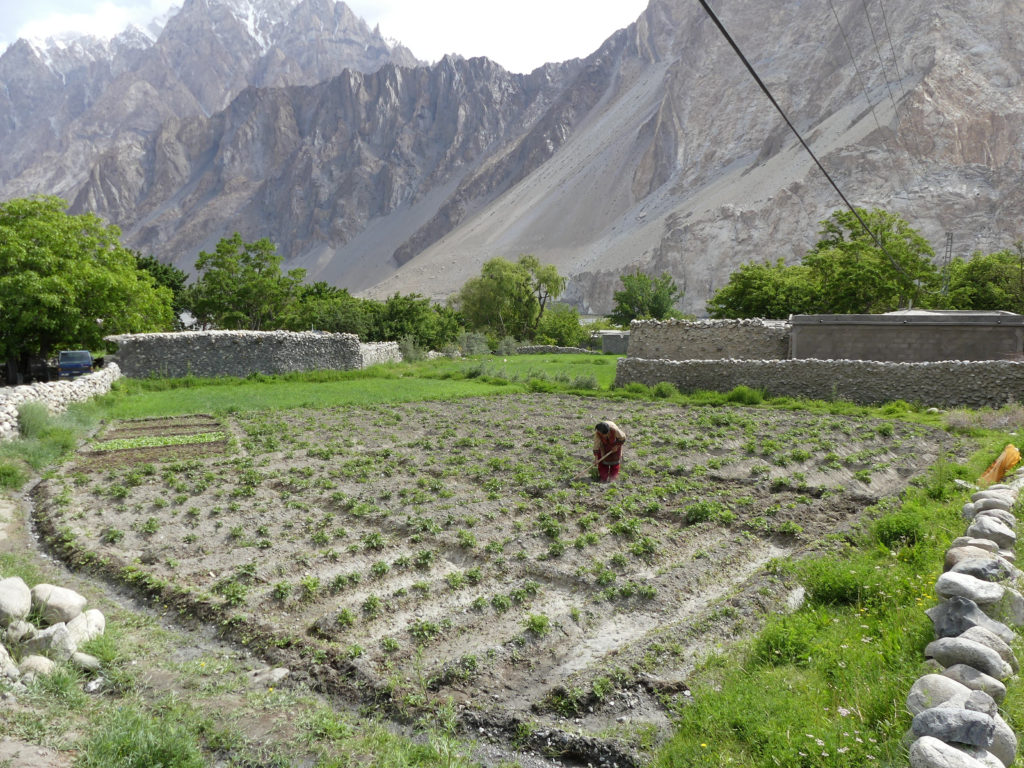
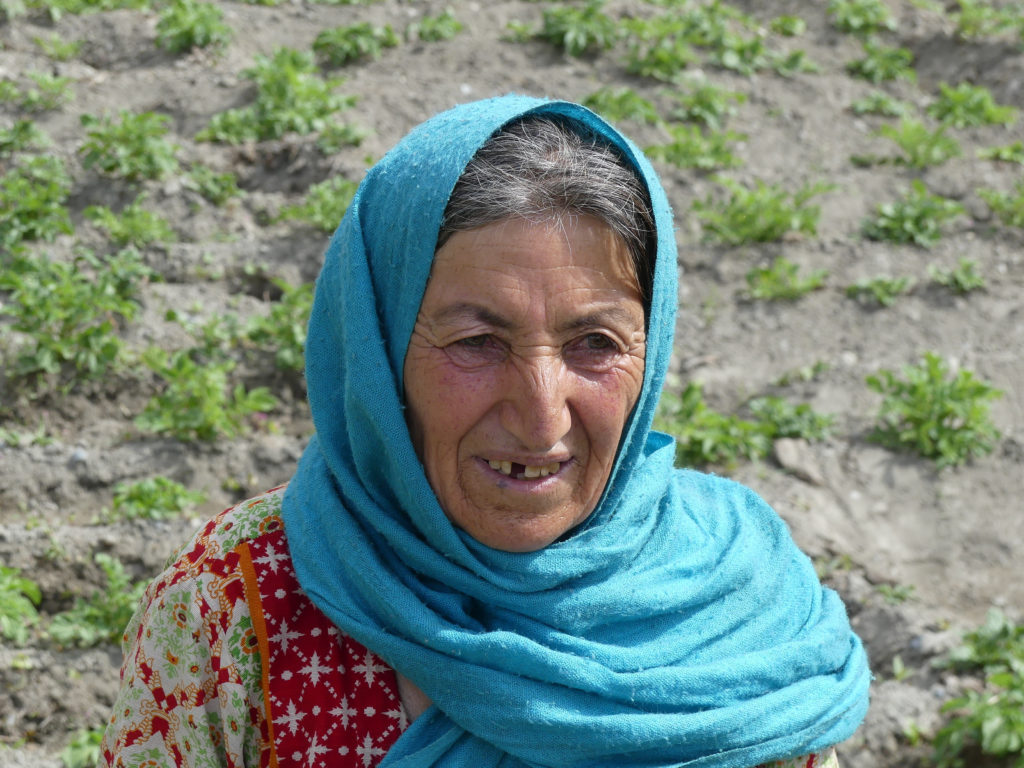
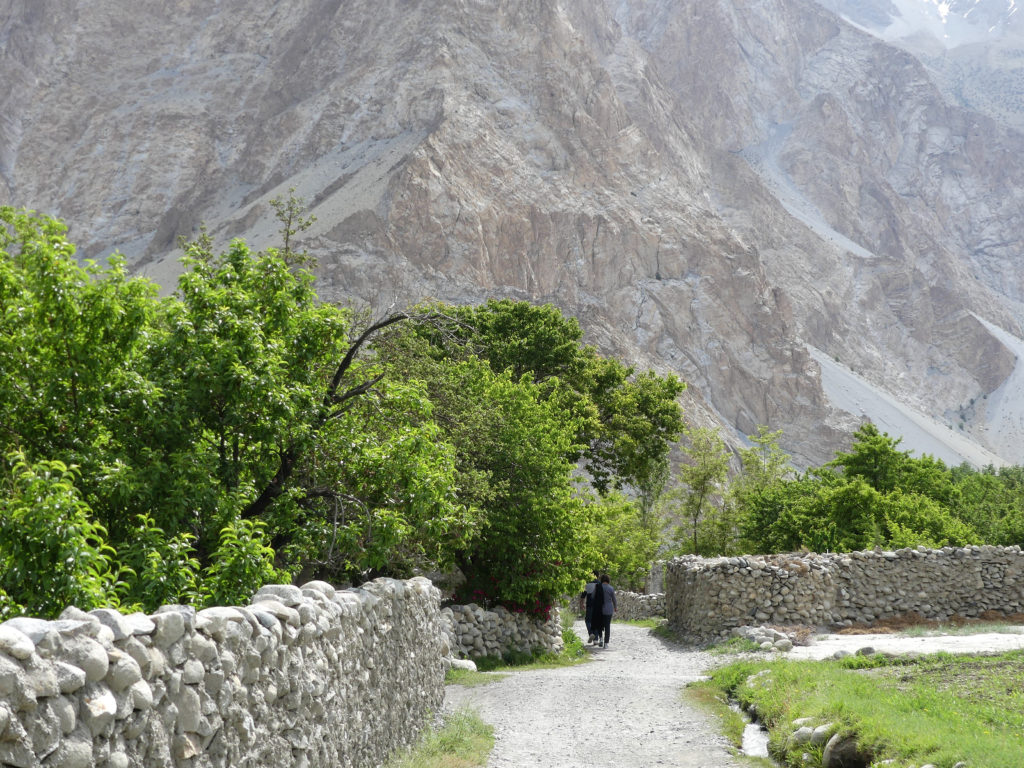
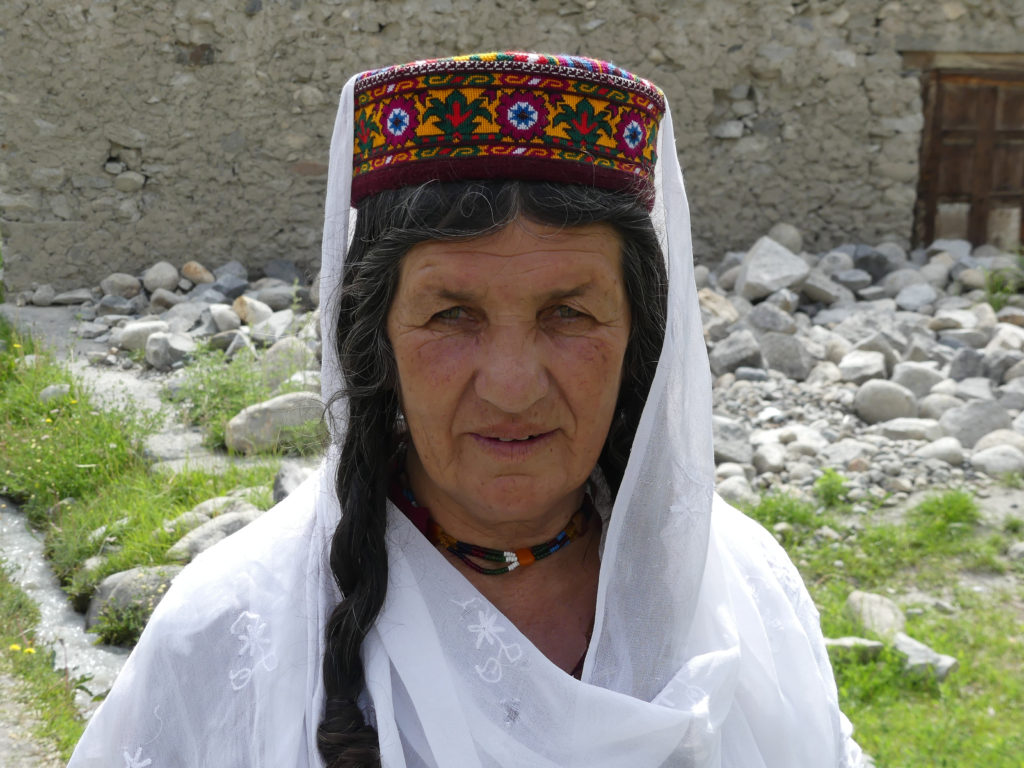
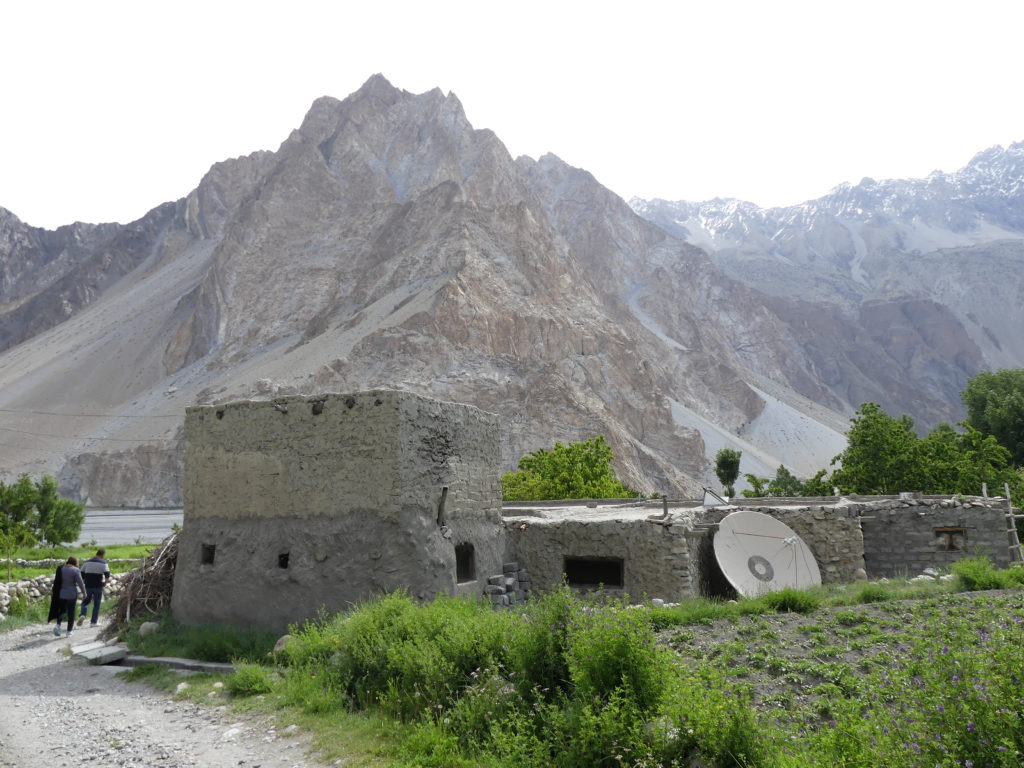
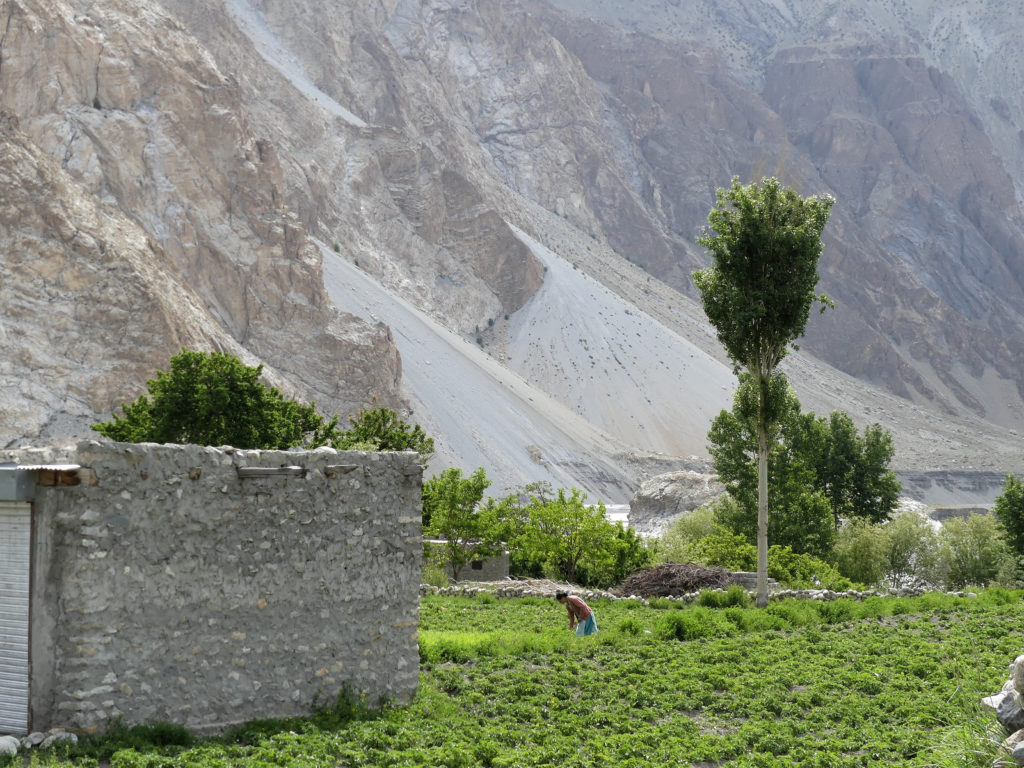
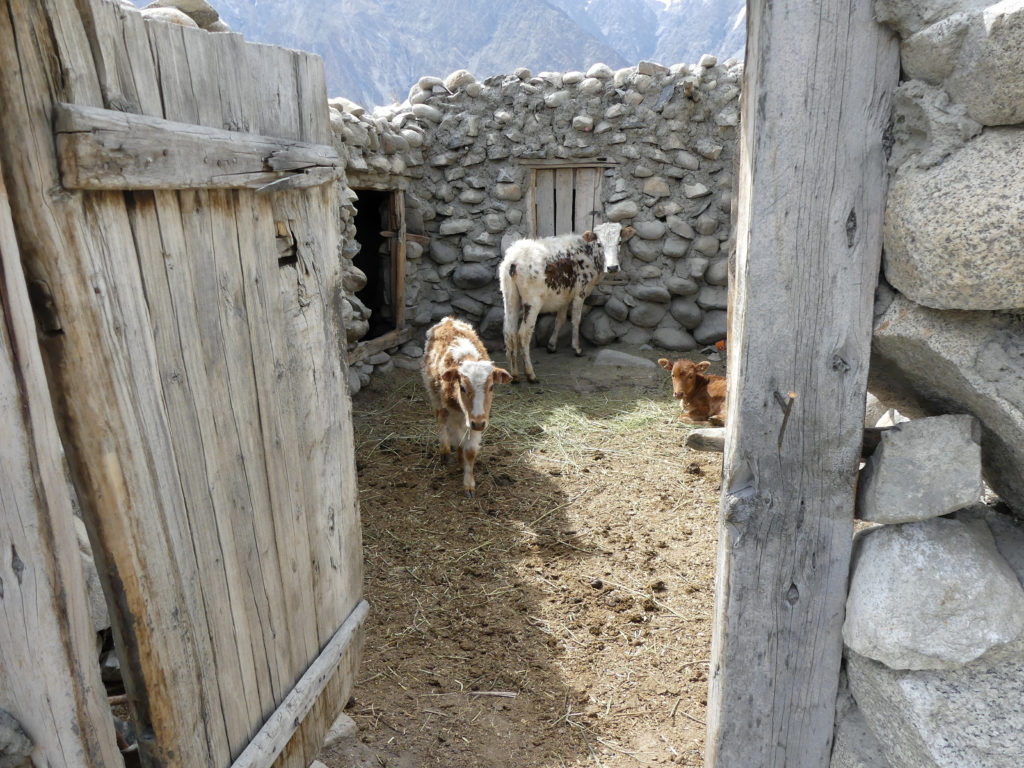
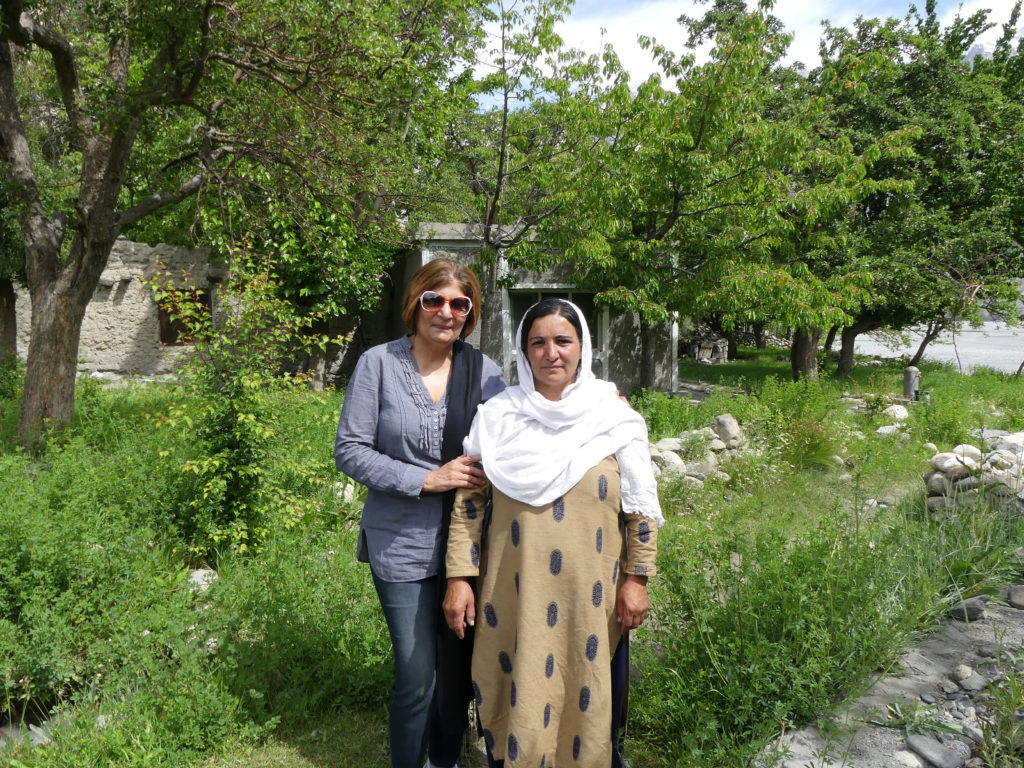
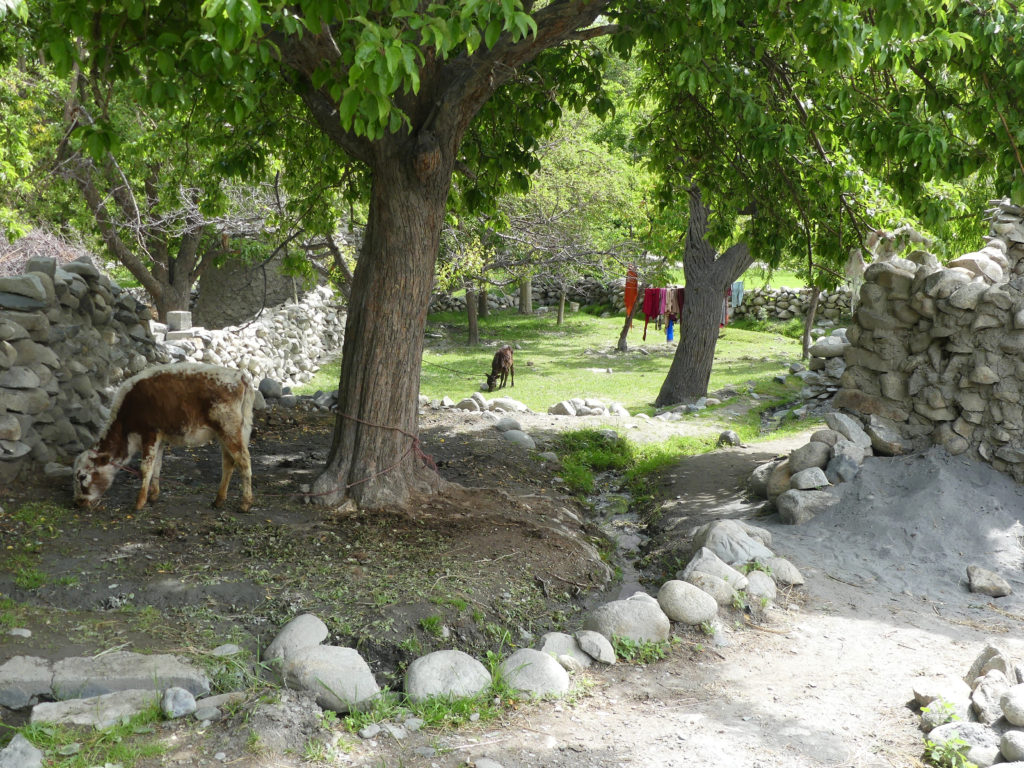
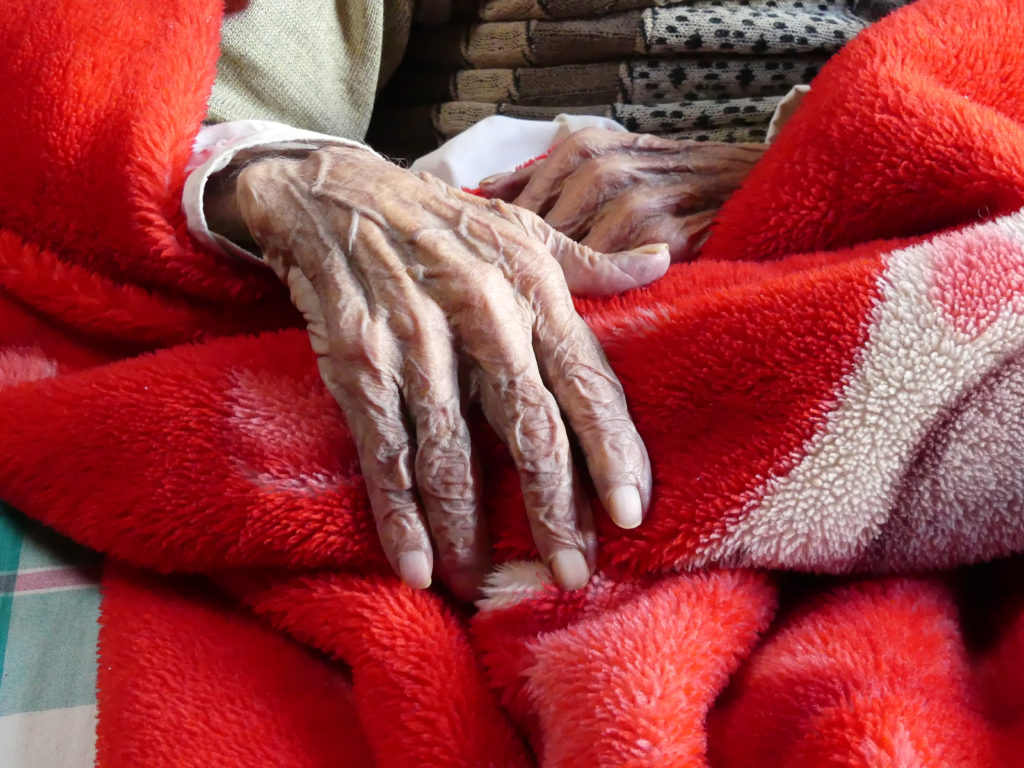
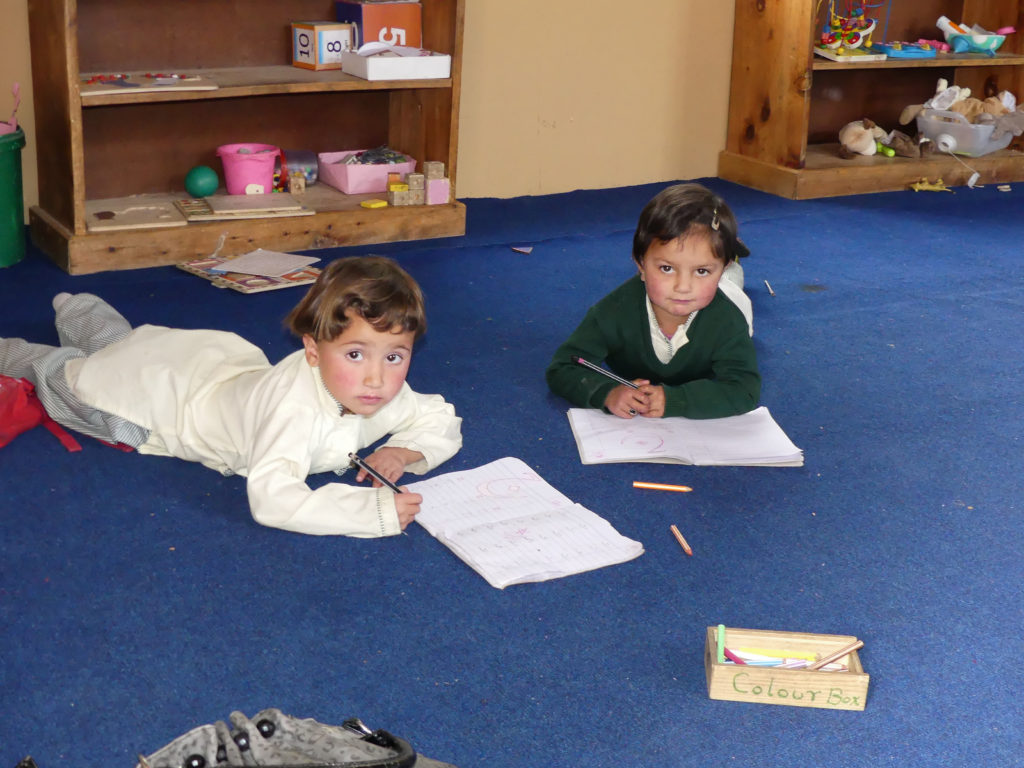
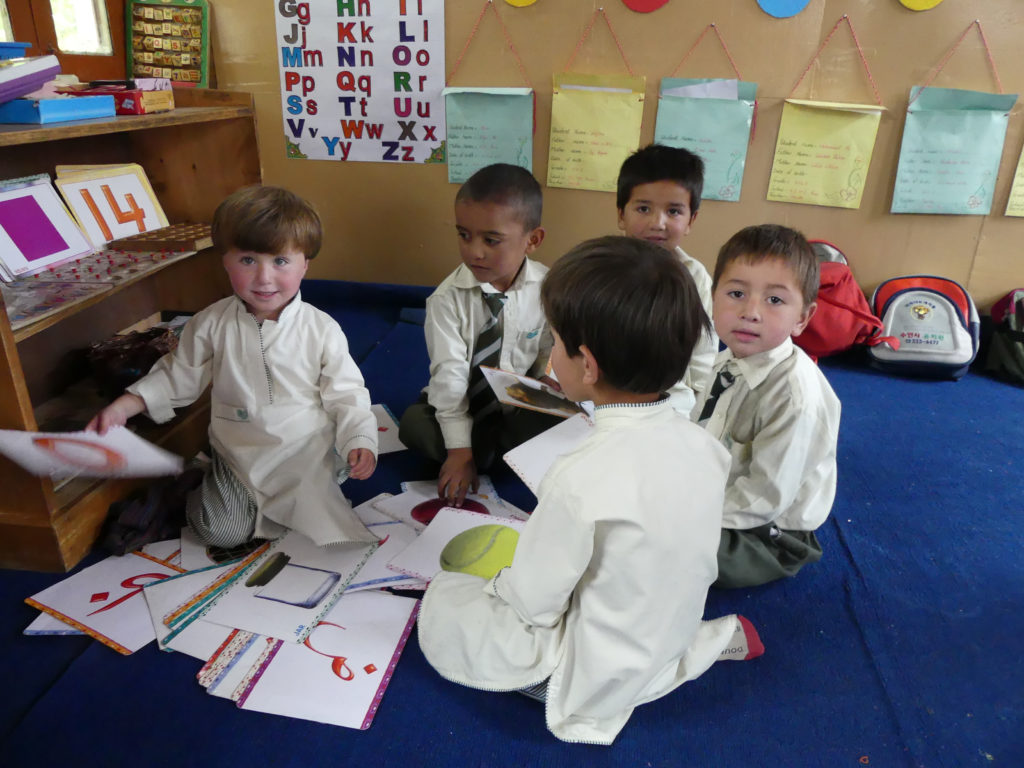
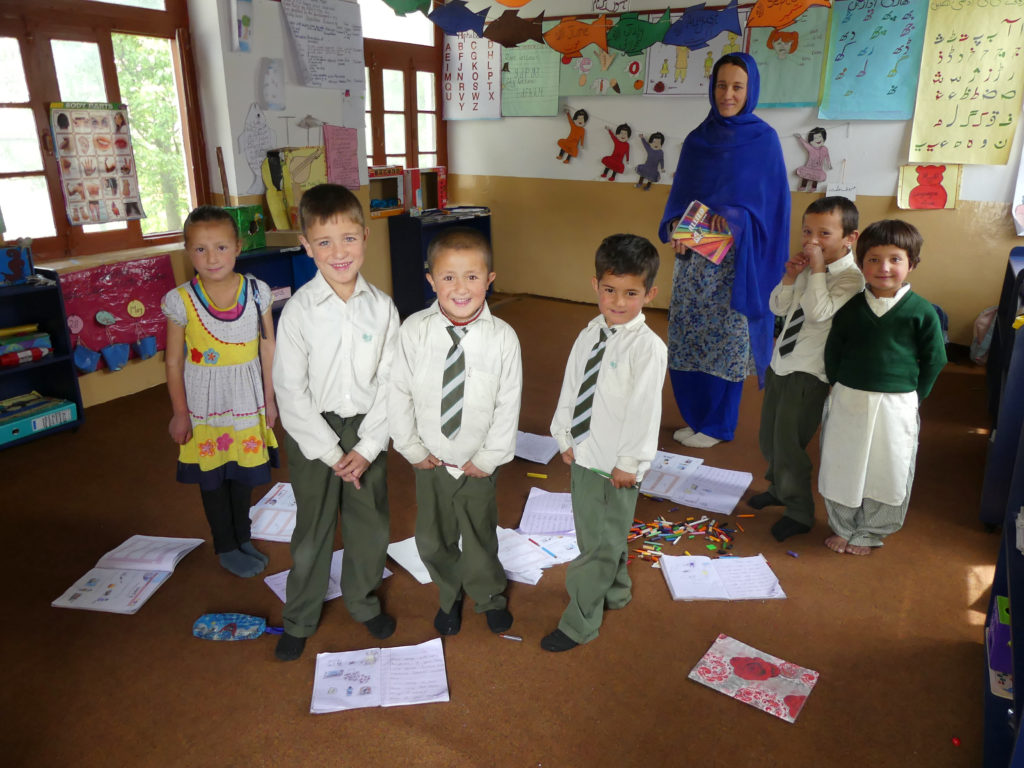
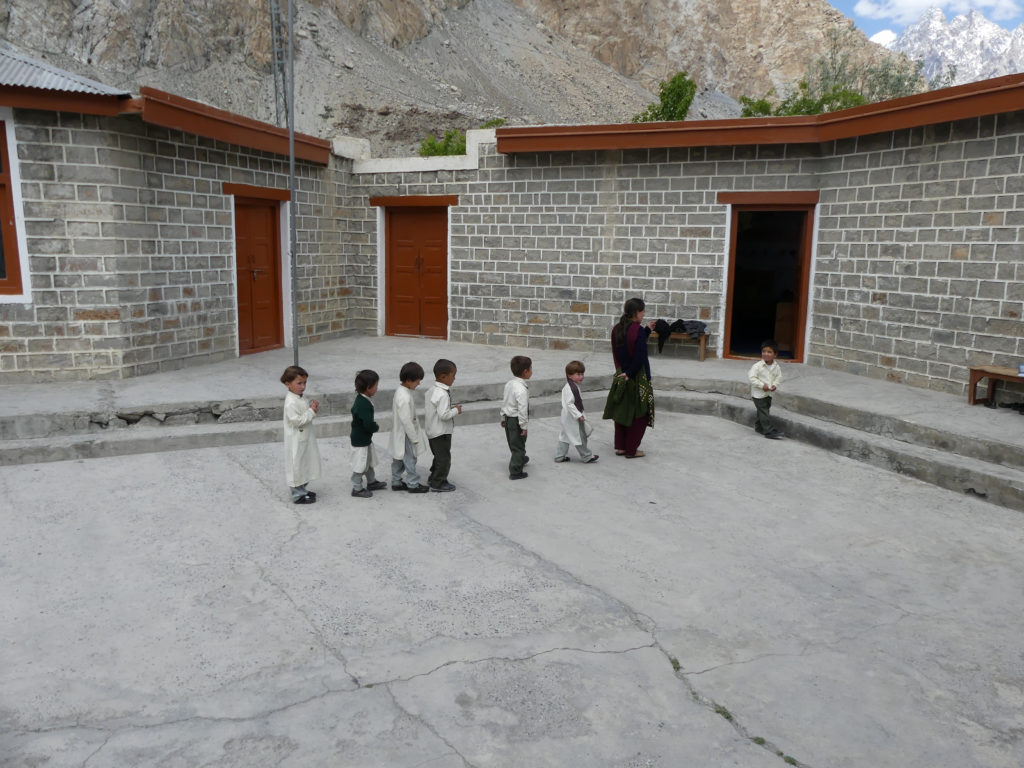
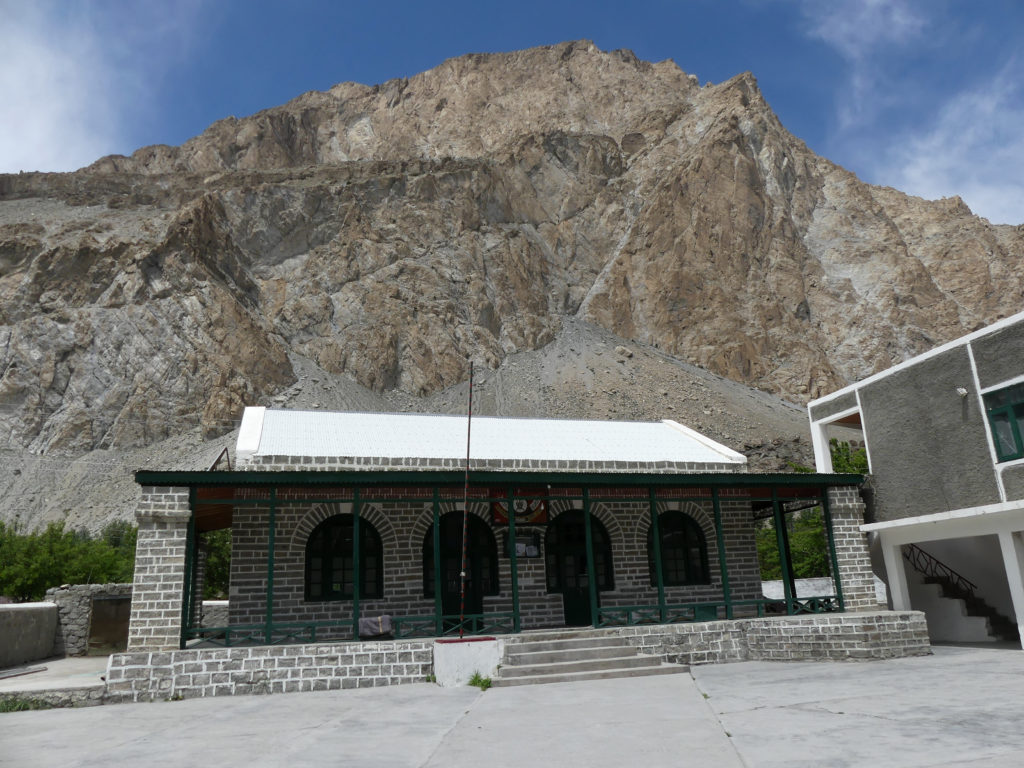
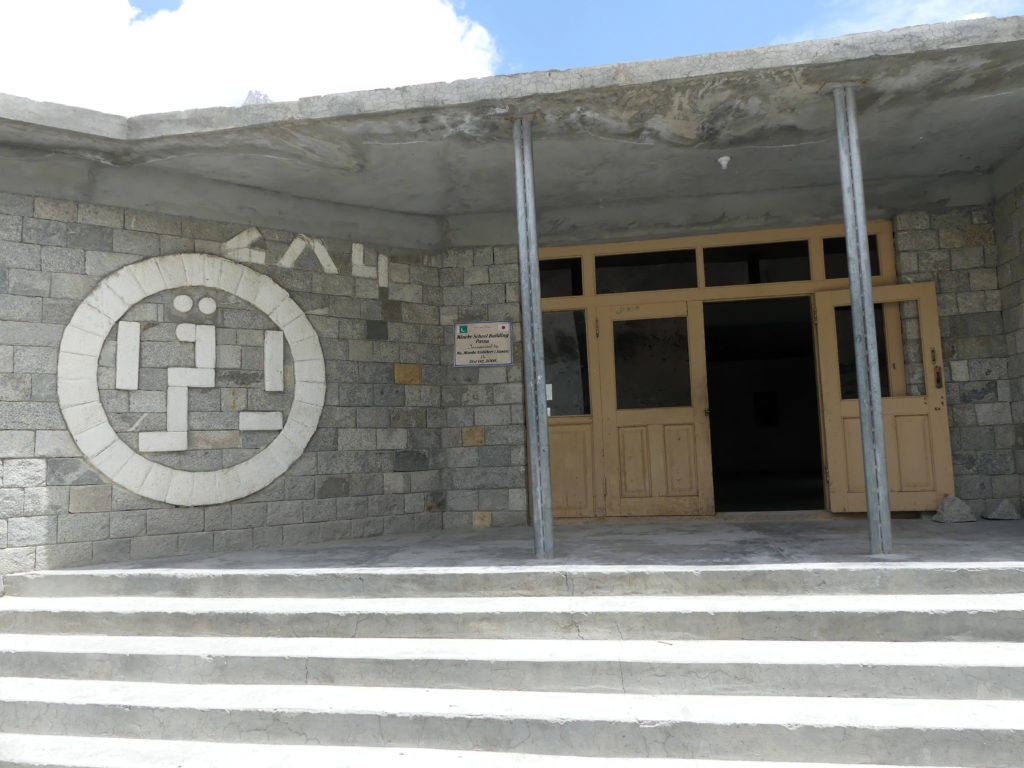
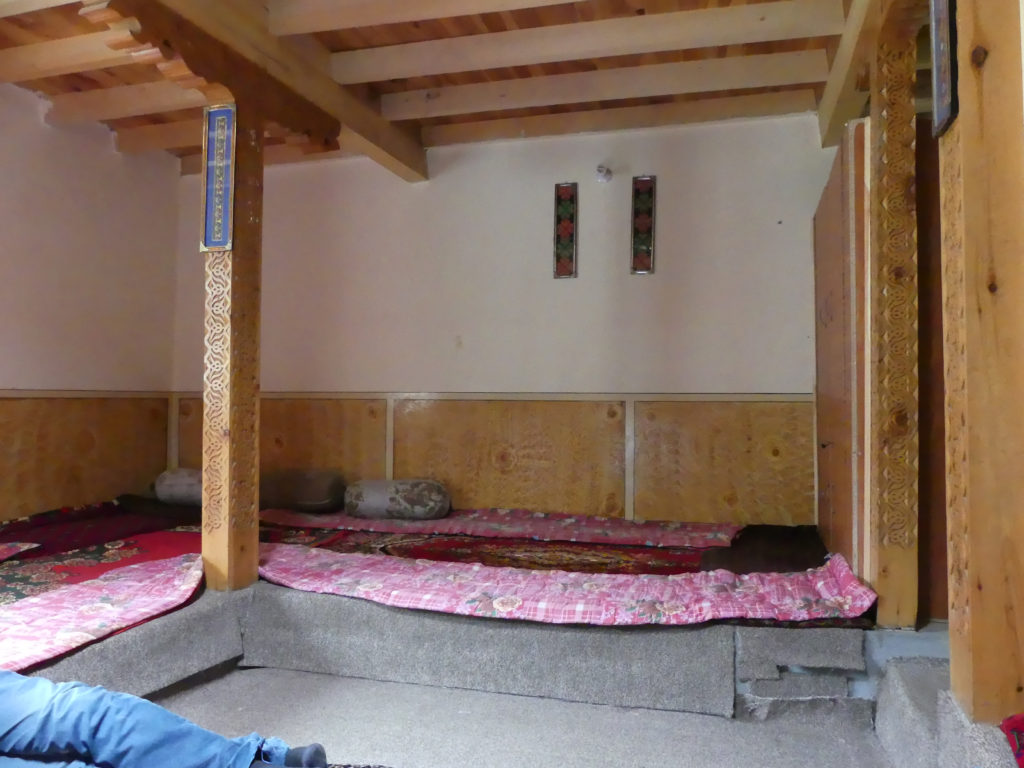
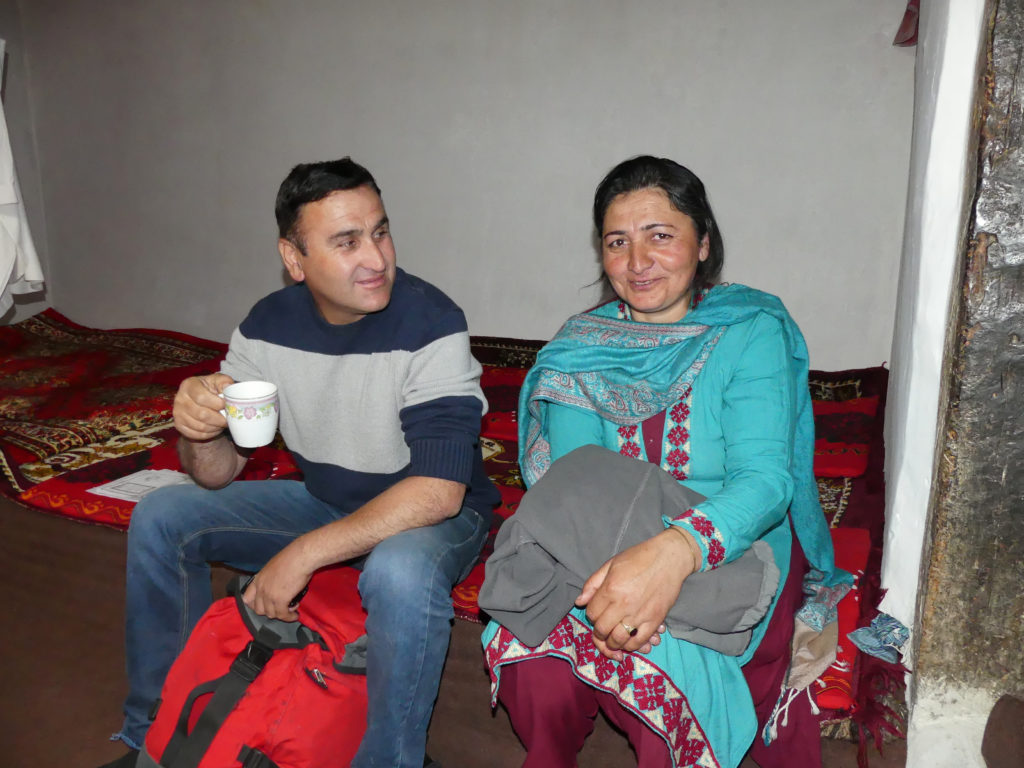
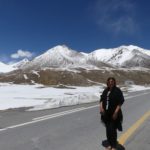
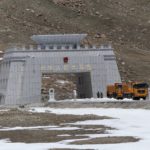
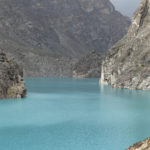
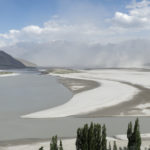
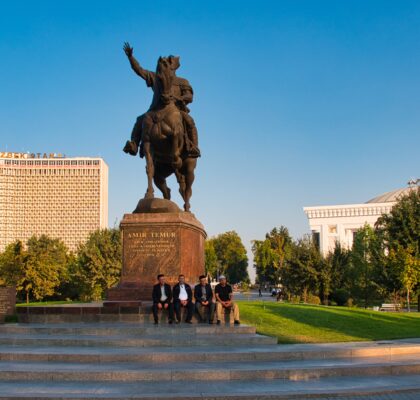
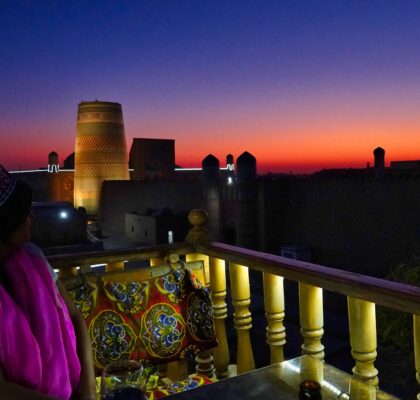
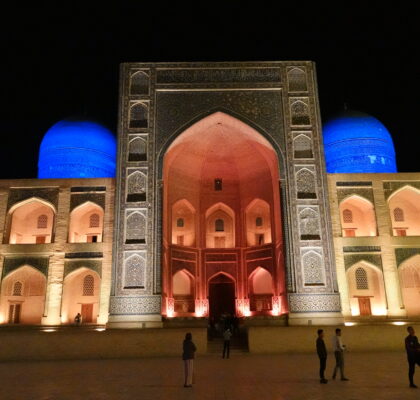
Pingback: Silk Road 7: Karakorum Highway (KKH) China to Pakistan over Khunjerab Pass Ali Karim Travelog
Yaali Ali,
Looks like you had a wonderful trip to Hunza Area. I am planning to go Mid March 2021. Thinking about the weather.
If you could kindly get me the names and addresses of Jamatkhanas in Hunza,Giligit: Skardu and in the neighbourhood. I also need the drivers e-mail with phone #.
That will be great.
Murad
Hi Murad, thanks for your feedback and message. I have PM’d you to your email, the info you requested
You will enjoy 🙂
Pingback: Silk Road 16: More Osh, Kyrgyzstan - Ali Karim Travelog Asia
Hi Ali Karim. very nice and informative blog. I am planning a trip next year and I wanted to know which travel agent/tours did you use?
HI Tayyab, thanks for the feedback. Apologies for the delay, as I was traveling. I have PM’d you the info you were looking for.
Thanks
Pingback: Silk Road 9: Karakorum Highway; Karimabad/Hunza, Pakistan - Ali Karim Travelog
Hi Karim: I like your blog. I am planning to visit Pakistan from Beijing. Do you mind share your some info on security, border visa, accommodation recommendation, transport for my trip plan reference. Thanks
Hello Chong, Thanks for your feedback. I have PM’d you the info you requested. I know you will enjoy this trip. as much as my wife and I did.
Ali Karim- I want to thank you for such a rich blog, both text and pics. I was in Tajikistan and Kyrgyzstan last year and it’s great to see how the Silk Road is so vast with so many commonalities and differences. Very much enjoying your trip whilst planning my own to Pakistan (and now possibly Kashgar region). I would be very grateful for the details of the travel company that you used in both countries. Thanks, Gill.
HI Gillian, So glad you enjoyed reading my blogposts, and found them useful. That part of the world is beautiful and you will enjoy it.
Tajikistan, Kyrgyzstan and Uzbekistan are on my list for another Silk Road trip; so I will have to pick your brains. I have PM’d you for the details you were looking for.
thanks for posting!. I’m making this trip in a months time. going from beijing to kashgar by train, then going to hunza by bus and then to islamabad… did you book a tour guide or…? i have asked around and its incredibly pricey! =/
Hi Mano, thanks for reading my blog. Yes, we did use the services of a guide in Kashgar onto Karakul and Tashgurgan; and then picked up another driver/guide in Sost, Hunza.
I will PM you their details.
Hi, we are planning a trip to Hunza. What travel agent did you use, and do you have their contact details? Would you recommend them?
Hello Naila, I have PM’d you the info you are looking for; please check your email
Nice collection and descriptions for the photographs .
THank you
Thanks for very well articulated information. I intend crossing the border from Pakistan to China in the last week of July 18. My question is that Can I travel to Kasghar, after reaching Tashkorgan, on the same day, if yes, then how? I would be using NATCO Bus for crossing the border from Sost.
Hi Shahid, thanks for reading my blogposts. In my opinion, it would not be possible to drive from Sost to Tashkurgan to Kashgar on the same day. Reason is mainly because the drive is long, and there is (was) a lot of construction on the KKH, and it took us almost a whole day (with stops) just to get from Kashgar to Tashkurgan. My advice would be to stay overnight in Tashkurgan to break the journey. Hope this helps
I’ve just found your blog and I’m starting to read through your Pakistan posts and I wanted to say thank you so much.
I blog, as you do for the sheer joy of travel and it looks like we love similarly off the beaten path destinations. Our last trip was to Sudan which I highly recommend. Anyway, my husband and I are considering a Karakoram trip later this year and really appreciate the time and care you’ve taken to describe your experiences. It’s very reassuring, particularly as this is a non-commercial site. Did you use a local travel agent and would you recommend them? Many thanks….
Hi welltravbrit; thanks for your kind words; really appreciate that and so glad you are finding my travelg useful. The Karakoram’s are a great place to connect with nature and enjoy some of the most beautiful scenery.
I highly recommend including Xinjiang, China as a starting point (https://alikarimtravelog.com/category/asia/china/silk-road-china/).
Sudan has not been on my bucket list, but I will check out your blog and I’m sure I will add it to my bucket list 🙂
I have PM’d you the info you were looking for. We basically planned it ourselves, and then used a tour company to provide us the car, driver and hotel bookings that we wanted; as well as the itinerary we wanted.
Thanks again
Pretty nice post. I simply stumbled upon your blog and wished to say
that I’ve really loved browsing your blog posts. In any case
I will be subscribing to your rss feed and I
am hoping you write again very soon!
Thanks Meghan; so glad you enjoyed my blog post
Very nice to read your blog. I live in Norway and plan to travel from Islamabad to Sost. From Sost it goes a daily bus to Tashkuran in China. I think to stay over one night there and come back to Pakistan the day after. Did you have some security issues there? We have a lot of safety here – so it’s very important. Otherwise I will just drive car to the border and come back.
Qasim, thanks. NO security issues,. So dont worry about that, so long as you take normal precautions. We never felt scared when we were there. People are very friendly. I recommend you spend more time in Xinjiang rather than just going to Tashkurgan and returning. THere is not much in Tashkurgan, so I highly recommend you take the same bus all the way to Kashgar as minimum. Spend a few more days in Xinjiang; you will not be disappointed. Let me know if you need more info